|
March 2012 Updates
The Great Sabbath...

[ This Shabbat is called Shabbat HaGadol, which is the "great Sabbath" immediately preceding the holiday of Passover. There is no Passover without the Lamb, chaverim.... ]
03.30.12 (Nisan 7, 5772) This Shabbat is gadol ("great") because it immediately precedes Passover and recalls the time when the lamb was selected for sacrifice... Among other things, our Torah portion for this Sabbath (Tzav) details the consecration of the priests who were required to be anointed with the blood of the lamb on their right ear, right thumb, and their big toe. Likewise the whole burnt offering of a lamb - with wine and matzah - was required every day and night as a tamid offering at the Tabernacle... The fire of the sacrifice of the lamb was never to go out on God's altar!
The Hebrew word "Hallel" (הַלֵל) means "praise," though in Jewish liturgy it refers to a series of Psalms (113-118) that are recited for the holidays. During the Passover seder, for instance, we recite the Hallel twice: first after retelling the story of our deliverance (i.e., after the Maggid step), and second after dinner, when we drink the "Cup of Redemption." It was this cup that Yeshua identified with the new covenant during the seder (Luke 22:20), and therefore this cup represents God's agreement to declare those who trust in the sacrificial death of Yeshua for the forgiveness of their sins to be justfied by faith. Indeed, after the Yeshua gave his disciples the third cup, they sang the Hillel (Matt. 26:27-30).
הַלְלוּ אֶת־יְהוָה כָּל־גּוֹיִם
שַׁבְּחוּהוּ כָּל־הָאֻמִּים
כִּי גָבַר עָלֵינוּ חַסְדּוֹ
וֶאֱמֶת־יְהוָה לְעוֹלָם
הַלְלוּ־יָהּ
ha·le·lu · et · Adonai · kol · go·yim
sha·be·chu·hu · kol · ha·u·mim
ki · ga·var · a·lei·nu · chas·do
ve·e·met · Adonai · le·o·lam
ha·le·lu · YAH

"Praise the LORD, all nations! Extol him, all peoples!
For great is his love toward us, and the truth of the LORD is forever.
Praise the LORD!"
(Psalm 117)

Download Study Card
Note: There is a "Shabbat Table Talk" for parashat Tzav that you can download here. As will be recited during the Passover Seder during the Hallel: Brukhim atem ladonai, oseh shamayim va'aretz: "May you be blessed by the LORD, who made heaven and earth!" (Psalm 115:15).
Secret Place of the Most High

03.29.12 (Nisan 6, 5772) One of the great Hebrew names of God is El Elyon (אֵל עֶלְיוֹן), often translated as God "Most High." The name first appears in the Torah regarding the mysterious figure of Malki-Tzedek (מַלְכִּי־צֶדֶק), the timeless king and priest of Zion who served "God Most High" (Gen. 14:18). Malki-Tzedek is the first priest (i.e., kohen: כּהֶן) named in the Torah, a mediator who ministered "bread and wine" to our father Abraham - alluding to the sacraments later use to commemorate our redemption. As the timeless king and priest of God, Malki-Tzedek is a "theophany," or a revelation of the LORD our God Yeshua before He emptied Himself and made his descent to this world (Phil. 2:7; Heb. 7:3). Yeshua is our great King of Kings and High Priest of the New Covenant, a better covenant that restores the kingship and priesthood back to God Himself (Heb. 7:12).
Now the name "Elyon" itself (עֶלְיוֹן) comes from a root word (עָלָה) that means to ascend. For instance, an olah offering (עלָה) is a whole burnt offering that ascends upward to heaven. Calling God Elyon expresses the truth that the LORD our God has ascended on high, the Resurrected One who overcame all the powers of hell and utterly vanquished death's power... In other words, Elyon is a name for the LORD our God Yeshua.
ישֵׁב בְּסֵתֶר עֶלְיוֹן
בְּצֵל שַׁדַּי יִתְלוֹנָן
אמַר לַיהוָה מַחְסִי וּמְצוּדָתִי
אֱלהַי אֶבְטַח־בּוֹ
yo·shev · be·se·ter · El·yon
be·tzel · Shad·dai · yit·lo·nan
o·mar · ladonai · mach·si · u·me·tzu·da·ti
E·lo·hai · ev·tach · bo

"He who dwells in the secret of the Most High
will abide in the shadow of the Almighty.
I will say to the LORD, "My refuge and my fortress,
my God, in whom I trust."
(Psalm 91:1-2)
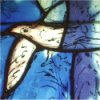
Download Study Card
The sages say that Moses wrote these words as he dwelled in the secret place (סֵתֶר) of the Most High God, in the "midst of the dark cloud" (Exod. 24:18), a place of sacred and holy concealment. As it is written, the thick clouds are a Hiding Place for Him (Job 22:14). Notice that the one who "dwells" in the secret of the Most High abides in an ascended place of rest - being lifted up far above the surrounding madness of this fallen world of flux and shadows. The Hebrew word is related to the word to lodge or "sleep" (לִין), connecting it with death and resurrection. By dwelling in the death and resurrection of Yeshua, God will shield you with His Presence and make evil powerless before you...
Since God hides Himself in this world (Isa. 45:15), we must humbly seek His face to enter into the place of His holy concealment in all things. God is Elyon – High above - but He dwells "with the lowly and the broken of heart" (Isa. 57:15). Therefore the LORD our God is called Shaddai (שַׁדַּי) – our Sustainer, Provider, Refuge, Fortress, our Home. Just as we can be surrounded by the "shadow of death" (tzal mavet), so we can be surrounded by the "shadow of Shaddai" (tzal Shaddai). Like a powerful eagle brooding over her chicks, so Shaddai covers you with wings of protection (Psalm 91:4).
When you "dwell" in the secret of Elyon - the Ascended One - you are concealed by the dark clouds of His Glory, and the Presence of Shaddai overshadows you... The LORD will save you from the ensnaring trap and from the devastating pestilence (Psalm 91:3). By abiding in the truth that God's Presence pervades all things at all times - you become a "stranger" (גֵּר) with the LORD in this world, a "sojourner" (תּוֹשָׁב) who awaits the recompense of the wicked and the healing of the world at the end of the age. "You will tread on the lion and the adder; the young lion and the serpent you will trample underfoot" (Psalm 91:13).
There is a "secret door" that you can enter at any time... This door leads to the realm of the Divine Presence, as David said: shiviti - "I have set the LORD always before me - because He is at my right hand, I shall not be shaken" (Psalm 16:8). But how did David "set the LORD" before Him if He did not "enter the door" by opening his eyes to behold God's hidden Glory?
At any given moment of our day, regardless of our present circumstances, we can attune ourselves to the reality of the Divine Presence and come "boldly before the Throne of Grace." The world knows nothing of this realm and is enslaved by appearances and the delusions of this realm, olam hazeh. As Yeshua said, "To you it has been given to know the secrets of the kingdom of heaven, but to them it has not been given" (Matt. 13:11). The Spirit of God always says, "Come, my people, enter your chambers, and shut your doors behind you" (Isa. 26:20). In the secret places of our heart - our "prayer closet" - we appeal to the Hidden Presence to be manifest in the midst of every circumstance of our lives...
אִם־אָמַרְתִּי מָטָה רַגְלִי
חַסְדְּךָ יְהוָה יִסְעָדֵנִי
בְּרב שַׂרְעַפַּי בְּקִרְבִּי
תַּנְחוּמֶיךָ יְשַׁעַשְׁעוּ נַפְשִׁי
im · a·mar·ti · ma·tah · rag·li
chas·de·kha · Adonai · yis·a·dei·ni
be·rov · sar·a·pai · be·kir·bi
tan·chu·me·kha · ye·sha·a·shu · naf·shi

"If I should say, 'My foot slips,'
your steadfast love, O LORD, holds me up.
When the cares of my heart are many,
your consolations will delight my soul."
(Psalm 94:18-19)
In the verse above, notice that the word "slips" comes from a root (מוֹט) that means to falter, shake, or totter in an unsteady way. The idea is that though the way forward may be shaky and insecure, God's love can be trusted to establish and keep the soul from falling. The word translated "cares" (שַׂרְעַפִּים) refers to hidden apprehensions, anxieties, etc, known only to God. The word is used in Psalm 139: 23, "know my anxious thoughts..." The word consolations (תַּנְחוּם) is related to the sigh of comfort that God breathes out.
We are made secure only on account of the LORD our God Yeshua, who gloriously ascended over the powers of this age, the hidden principalities of darkness, and who made safe passage for us to come by means of his sacrificial death on the cross. Yeshua is the Bridge and the Way to the truth that sets you free, though He indeed is the narrow bridge. Because of Him alone, we have access to the Divine Presence, the Holy of Holies made without human hands. Yeshua is the Ascended LORD of Glory, the Master of all possible worlds, and the King over all things. Nothing can stop Him or thwart His victory secured for those who trust in Him. Blessed is the Name of the LORD forever and ever, Amen.
Note: I am close to finishing the first draft of the new (and improved!) Hebrew for Christians Passover Haggadah... I hope to have it done within the next few days. Of course a free PDF download will be available here. Shalom chaverim!
 |
The Very First Passover...
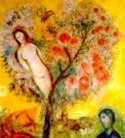
[ The great holiday of Passover will be here in less than two weeks, chaverim! The following entry is part of a new Haggadah I am presently writing for the upcoming seder... ]
03.28.12 (Nisan 5, 5772) The story goes back to the very beginning, to the orchard of Eden itself, when Adam and Eve disobeyed God and ate from the forbidden tree. Because of their transgression, our original ancestors incurred the plague of death and were exiled from the Divine Presence, though God graciously promised to heal them through the coming Seed of the woman – the Savior who would crush the head of the serpent and break the fangs of his venomous sting. Soon after making this promise, God clothed our original parents with the skin of a sacrificed lamb, linking their coming deliverance with the "Lamb of God slain from the foundation of the world." The very first "Passover" was in the garden...
The great story of our redemption is revealed on two levels in Scripture - one that concerns the paradise of Eden (the universal level), and the other that concerns the paradise of Israel (the particular level). Therefore Yeshua is both rightly called the "Lamb of God who takes away the sins of the world" (John 1:29) and "the Messiah our Passover Lamb who has been sacrificed for us" (1 Cor. 5:7). Likewise he is both called the "Seed of the woman," and "the Son of David"; the "Second Adam," and the "King of the Jews," and so on.
The story of Israel's redemption in Egypt therefore serves as an allegory of both the universal salvation promised in Eden (i.e., the lamb slain from the foundation of the world) as well as the revelation of the sacrificial ministry of Yeshua as Israel's promised Messiah. Yeshua is both the Savior of the world as well as Israel's true King and Deliverer.
Just as it was through Eve's doubt in God's goodness that Satan gained his advantage, so it was through Eve's teshuvah (repentance) that she would find salvation. And just as it was through Adam's sin that the plague of death came into the world, so it was through Yeshua's sacrificial death that life and healing would come. Yeshua was "bruised" through his sacrifice on the cross, but through it he crushed the head of the serpent and broke the fangs of his venomous sting. Access to the Tree of Life is now available in the renewed paradise of God. Yeshua is the Savior of the world and the One who rebuilds the fallen tabernacle of Eden.
Looked at from another perspective, Egypt represents the world system that enslaves people (the word mitzrayim comes from the word tzur (צוּר), meaning "restriction"). As the ruler of this world, Pharaoh therefore represents Satan, the original serpent who deceived Eve in the orchard. Egypt therefore represents a state of exile (similar to the original exile from Eden), and just as the blood of the lamb applied to the doorposts in Egypt caused the plague of death to pass over, so the blood of Yeshua saves us from the wrath of God and spiritual death. Yeshua said that by nature people were in bondage to the dictates of this world system and its forces and needed to be set free. The Hebrew word for salvation (יְשׁוּעָה) means to be set free from the restrictions of "Egypt" and its forces.
The Apostle Paul likened the crossing of the sea as a metaphor of baptism: "All were baptized into Moses in the cloud and in the sea" (1 Cor. 10:1-2,11). In the New Testament, baptism symbolizes our identification with Yeshua's death, burial, and resurrection (Col. 2:12; Rom. 6:3-5). Some Christian commentators make a strong distinction between these two baptisms (i.e., baptism into Moses and baptism into Messiah), though there are many profound correspondences. For instance, the Israelites were facing death and were therefore at the "end of themselves." They had no other appeal or hope than God's gracious intervention on their behalf (i.e., salvation). Still, they needed to act and move forward. After they took the step of faith, they could see the Shekhinah Glory lighting up the way of deliverance, though this meant being "buried" within the midst of the sea. Their earlier fear of death was replaced with a song of God's great deliverance. The other side of the sea represented new life, the life that comes from above, by the power and agency of the Holy Spirit... The Israelites died to their old life, were symbolically buried in the waters, but rose to new freedom by the grace and power of God... Shifting the analogy somewhat, the crossing of the sea represented a sort of "birth canal" into the realm of true freedom as God's redeemed children.

Just as the Israelites were made free from the tyranny of Pharaoh when they crossed the Sea - being "baptized into the death of the waters" to be reborn to serve God in freedom – so those who trust in Yeshua are "baptized into His death" and reborn to serve God by the power of the Holy Spirit.
Personal Update: My boys are both sick with colds and I am asking for your prayers, especially for Judah, whose 3rd birthday is this coming Shabbat. Please pray that we all will be healthy for the upcoming Passover Seder, too... Thank you, chaverim.
The Broken Middle Matzah...
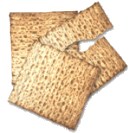
[ Passover will be here in less than two weeks. The first Seder will be Friday night, April 6th; the second Seder (for those living outside of Israel) will be Saturday night, April 7th. ]
03.26.12 (Nisan 3, 5772) During the Passover Seder, we have three matzahs on the table, said to represent Abraham, Isaac and Jacob, respectively. During the Yachatz step of the seder, the middle matzah (representing Isaac) will be broken to recall how Isaac was sacrificed in obedience to his father, which is a clear picture of the sacrifice of Yeshua by God the Father. Indeed, the Talmud states, "We break the middle matzah in tribute to Yitzchak (Isaac), who accepted the sins of the people upon himself" (Shabbos 89b). The smaller half of this broken matzah will be eaten later during the Motzi Matzah step, while the larger half will be eaten during the Afikomen step, near the end of the night...
In Hebrew, the middle of something is it's heart - the heart of the heavens, the heart of the earth, the heart of the sea, the heart of a person... Since the offering of Isaac by Abraham foretold of the greater offering of Yeshua by God Himself, when we break the middle matzah, then, we recall the broken heart of God over the pain Yeshua endured by taking our sins upon Him at the cross...."For our sake he made him to be sin who knew no sin, so that in him we might become the righteousness of God" (2 Cor. 5:21).
During his Passover seder with his disciples, Yeshua "took matzah, and after blessing it broke it and gave it to the disciples, and said, "Take, eat; this is my body" (Matt. 26:26). Since Yeshua did this while they were eating dinner, the matzah he broke would have been the Afikomen, thereby making the connection between the hidden bread (lechem ha-nistar) that would be broken given for our deliverance. The matzah we eat during Passover is called lechem oni (לֶחֶם ענִי) - "the bread of [His] suffering" - and eating the Bread of Life that was "broken for us" remembers the great suffering of our LORD...
Note: I am updating (and simplifying) the Hebrew for Christians Passover Haggadah to make it a bit more interactive this year... I hope to have it finished a few days before the holiday.... Shalom chaverim!
 |
Shabbat HaGadol - שבת הגדול

[ This coming Shabbat is called Shabbat HaGadol, which is the "great Sabbath" immediately preceding the holiday of Passover. There is no Passover without the Lamb, chaverim.... ]
03.26.12 (Nisan 3, 5772) After God explained to Moses that the redemption would occur in the month of Nisan (Exod. 12:1-2), the LORD gave him instructions regarding the sacrificial rite of Passover: "Tell the congregation of Israel that on the tenth day of this month (i.e., Nisan 10) every man shall take a lamb ... without blemish, a male a year old, and shall keep it until the fourteenth day of this month, when the whole assembly of the congregation of Israel shall kill their lambs between the evenings (i.e., bein ha-arbayim: בֵּין הָעַרְבָּיִם). Then they shall take some of the blood and put it on the two doorposts and the lintel of the houses in which they shall eat it" (Exod. 12:3-7). According to Jewish tradition, since the Exodus occurred on Thursday, Nisan 15th, the tenth of that month was actually a Sabbath day, and this was later commemorated as "gadol" (great) because it marked the time when the lamb was selected for the great sacrifice.
Notice that the lamb was to be brought to the home and watched closely for a few days to ensure that it was healthy and free from any defect (the Pesikta de-Rav Kahana says that the lamb was tied to the bedposts inside the house, whereas the Torah Shelimah says the lamb was tied to the doorpost outside of the house). During this time, the family would become personally attached to the lamb, so that it would no longer simply be "a lamb" (Exod. 12:3) but rather their lamb" (Exod. 12:5). On the afternoon of the 14th, a family member was to slaughter the lamb and smear its blood on all three sides of the doorframe, top, right and left (Exod. 12:6), that is, in the form of the letter Chet (ח). This letter, signifying the number 8, is connected with the word chai (חי), short for chayim (חיים), "life." Even though the entire nation was responsible for the death of the lambs, each family was to personally apply its blood upon their own doorpost as a sign of their faith in the Lord's deliverance (Exod. 12:7). The use of sacrificial blood was later enshrined in the rites of the Mishkan (Tabernacle) using the principle, "the life is in the blood" (Lev. 17:11).
The New Testament notes that it was on Nisan 10 when Yeshua made His triumphant entry into Jerusalem riding on a donkey, signifying His Messiahship, in fulfillment of the prophecy of Zechariah: "Rejoice greatly, O daughter of Zion! Shout aloud, O daughter of Jerusalem! Behold, your king is coming to you; righteous and having salvation is he, humble and mounted on a donkey, on a colt, the foal of a donkey" (Zech. 9:9). During this time, when the pilgrims had come to select the korban Pesach - the lamb for the Passover sacrifice- they saw Yeshua and cried out: hoshiah na (הוֹשִׁיעָה נָּא), meaning "please save" or "save now" (in English this phrase was translated from the Latin to form "Hosanna!"). The people spontaneously began singing Psalm 118:25-26 in anticipation of the great Messianic hope:
אָנָּא יְהוָה הוֹשִׁיעָה נָּא
אָנָּא יְהוָה הַצְלִיחָה נָּא
בָּרוּךְ הַבָּא בְּשֵׁם יְהוָה
בֵּרַכְנוּכֶם מִבֵּית יְהוָה
an·na · Adonai · ho·shi·ah · na
an·na · Adonai · hatz·li·cha · na
bar·rukh · ha·ba · be·shem · Adonai
be·rakh·nu·khem · mi·bet · Adonai

"Please, LORD save us!
Please, LORD rescue us!
Blessed is He who comes in the Name of the LORD
We bless you from the house of the LORD."
(Psalm 118:25-26)

Hebrew Study Card
Over the course of the following few days Yeshua was thoroughly "inspected" by the kohanim (priests), scribes, and Pharisees, but was found to be tam (תָּם) - without spot or blemish. After his illegal arrest and prosecution, our Lord was crucified (before sundown) on Nisan 14, prophetically corresponding with the time when the Passover lambs were sacrificed at the Temple. His body was removed from the cross before sunset, just before Passover began, in accordance with the dictates of Jewish law. So we see then that Nisan 10 marks the date when Yeshua, our great Lamb of God, was examined and unwittingly "chosen" to be sacrificed for the sins of the entire world...
רָאוּי הַשֶּׂה הַטָּבוּחַ לְקַבֵּל גְבוּרָה
עשֶׁר וְחָכְמָה וְכּחַ וִיקַר וְכָבוֹד וּבְרָכָה
ra'uy · ha-seh · ha-ta·vu·ach · le·ka·bel · ge·vu·rah,
o·sher · ve·chokh·mah · ve·ko·ach · vi·kar · ve·kha·vod · uv·ra·kha

"Worthy is the Lamb who was slain, to receive power and wealth and wisdom
and might and honor and glory and blessing"
(Rev. 5:12)

Hebrew Study Card
Note: Even though the Torah clearly states Nisan 10 as the date to select the lamb (see Exod. 12:3), Jewish tradition does not observe it a holiday, since Miriam, the sister of Moses, later was said to have died on this day. Because of this tradition, the rabbis came up with "Shabbat HaGadol" as a movable holiday on the calendar (i.e., the Sabbath before Passover). This is unfortunate, since Nisan 10 marks the date that Joshua later led the Israelites across the Jordan (Josh. 3:14-17), and it also marks the time of Yeshua's triumphal entry to Jerusalem before His crucifixion (see above). I should add that there is another tradition, dating back to the 13th century A.D., that says Shabbat HaGadol is actually a corruption of Shabbat Haggadah (שָׁבַּת הַגָּדָה), the "Sabbath of the Haggadah," since it was customary to review the Haggadah on the Sabbath preceding Passover to prepare for the Seder. Some other sages disagree, however, and say that the Sabbath is called "gadol" (great) simply because the assigned Haftarah portion reads, "Behold, I will send you Elijah the prophet before the great (הַגָּדוֹל) and awesome Day of the LORD comes" (Mal. 4:5).
 |
Parashat Tzav - צו
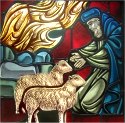
[ The following relates to this week's Torah reading (Tzav), which is always read either just before Passover or just before Purim (on leap years).... ]
03.25.12 (Nisan 2, 5772) The Torah portion for this week (i.e., for Shabbat HaGadol) is parashat Tzav. Of particular interest in this Torah portion is the Ram of Ordination (i.e., eil ha-milu'im: אֵיל הַמִּלֻּאִים) whose blood was sprinkled upon Aaron as the Kohen Gadol of the newly established Mishkan (Tabernacle).
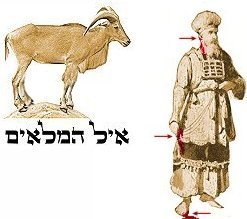
The blood of the male lamb (i.e., ram) was put on the right ear, right thumb, and big toe of the Aaron and his sons (a clear picture of Yeshua and His sacrifice as the coming greater High Priest) and the rest of the blood was dashed upon the sides of the mizbe'ach (altar). After its slaughter, Moses also took the innards of the ram and some unleavened bread and put them in the hands of the priests to perform tenufah (a wave offering) before burning them upon the altar (a picture of the resurrection). Finally, Moses mixed some of the blood of the ram and anointing oil and sprinkled it on the priest's garments to sanctify them.
As believers in Yeshua, we too have been anointed with the blood from the Ram of Ordination -- Yeshua as our Kohen Gadol of the better covenant (Heb. 8:6)! And we too have been anointed with the sacred shemen (oil) that symbolizes the presence and aroma of the LORD in our lives. As followers of Yeshua we are therefore truly "...a chosen race, a royal priesthood, a holy nation, a people for his own possession, that you may proclaim the excellencies of him who called you out of darkness into his marvelous light" (1 Peter 2:9). May the LORD be pleased to help you serve Him in the truth.
 |
Torah of Forgiveness...

03.23.12 (Adar 29, 5772) Regarding the question of faith, Soren Kierkegaard once wrote, "The easiness of Christianity is distinguished by one thing only: by the difficulty. Thus the Master's yoke it easy and its burden light -- for the person who has cast off all his burdens, all of them, the burdens of hope and of fear and of despondency and of despair -- yet it is difficult." Yes, the difficult thing is to truly believe (John 16:31). Sins can be like great possessions that are difficult to give up. Among other things, we must forgive ("give away") our sins (both our own and those against us), and that means trusting God enough to bear our wounds for us. Forgiveness allows us to move on with our lives by letting go of the pain of the past (2 Cor. 5:16). It is "easy" to understand this, but it is difficult to live it.
הַשְׁלֵךְ עַל־יְהוָה יְהָבְךָ
וְהוּא יְכַלְכְּלֶךָ
לא־יִתֵּן לְעוֹלָם מוֹט לַצַּדִּיק
hash·lekh · al · Adonai · ye·hav·kha
ve·hu · ye·khal·ke·le·kha
lo · yit·ten · le·o·lam · mot · la·tzad·dik

"Cast your burden on the LORD,
and He will sustain you;
He will never permit the righteous to be moved."
(Psalm 55:22)
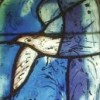
Hebrew Study Card
The Torah of Yeshua (תּוֹרַת יֵשׁוּעַ) therefore includes these additional commandments:
- "Thou shalt believe thou are my beloved - entirely accepted and entirely forgiven"
- "Thou shalt forget the shame of thy past"
- "Thou shalt stop thinking of your sin but rather of My great remedy for you"
- "Thou shalt let me carry your woundedness far away, yea, to the bottom of the sea"
- "Thou shalt live in My love and be filled with its spirit"
The difficulty, I repeat, is to genuinely believe that love's miracle is for you - and that therefore you really are a "new creation" in the Messiah (2 Cor. 5:17). The reason this is difficult is because we are still living in an "already-not-yet" place of exile, the "two-souled" state of being that only is able to "see through a glass darkly." We are trusting in God, yet we must "work out" our own salvation with fear and trembling (Phil. 2:12). But notice that we "work out" what God has already "worked in," since it is "God who works in you both to will and to do His good pleasure" (Phil. 2:13). Please do not miss this - God first works His love into our hearts, and then we are able to express that in works of love... From start to finish, only genuine faith in Yeshua performs the "work of God" (John 6:28-29), and never our own ludicrous efforts of affecting self-righteousness (Titus 3:5). If you are lacking in the fruit of the Spirit (i.e., the works of God), then the right approach is to turn around and confess your faithlessness: "Lord, I believe; help Thou my unbelief..." (Mark 9:24). Our LORD is near to the brokenhearted and saves the crushed in spirit (Psalm 34:18).
Some people might argue that you must "deny yourself" and "die to yourself" to exercise genuine faith, and while it is indeed true that "unless a seed falls to the ground and dies, it abides alone" (John 12:24), we must remember that the Seed is Yeshua and the power of His Spirit sown in the heart of faith. "Taking up the cross" therefore means so identifying with Yeshua that you are "in union" with his sacrificial death offered up on your behalf. God imparts a new spiritual nature (i.e., heart and spirit) to the one that trusts in Him, an operation of the Spirit that is more manifest than the sun that shines in the clear noonday sky... Taking up the cross is therefore the confession that Yeshua's sacrifice is all-sufficient and therefore all that remains is to continue to trust in his finished work (John 6:29). We are sanctified in exactly the same way we are justified -- by trusting in the miracle of God. Remember, all the imperatives of Scripture are addressed to the "new man" that has been brought to life by God's grace. We are able to obey when we yield to the Torah of the Spirit of Life (תוֹרַת רוּחַ הַחַיִּים) in the Messiah, which is to say, when we are trusting in Yeshua to do and to be all that we will ever need. We do not "die to ourselves" by means of our own efforts, but instead rest in the peace of Yeshua's sacrificial death (and resurrection) for us.
This Shabbat marks Rosh Chodashim - Biblical New Year's Day - so let me wish you "shanah tovah" and great blessings as we begin a new year together! I hope you will find inner peace and healing as you continue to walk in the truth of God's salvation, chaverim.
Note: There is a "Shabbat Table Talk" for our Torah portion this week (Vaikra) that you can download here. May the grace and peace and power of God Almighty rest upon you.
 |
Why the Sacrifices?

[ The Bible is described as a "book of blood and a bloody book." In the Torah, just as in the New Testament, sacrificial blood is connected to atonement and the forgiveness of sin. ]
03.22.12 (Adar 28, 5772) The Book of Leviticus (וַיִּקְרָא) centers on the various laws of sacrifice pertaining to the Mishkan (Tabernacle), and therefore it is undeniable that sacrifice is an integral part of the both Jewish law and the Torah. Indeed, even today the traditional Jewish liturgy includes prayers that appeal for the rebuilding of the Temple and the reinstatement of the sacrificial system. Nonetheless the sages wondered why God demanded offerings of animals and grain as part of his worship. Surely God has no physical need for these things: "For every beast of the forest is mine, and the cattle upon a thousand hills" (Psalm 50:10), and unlike pagan sacrificial rites, the sacrifices of the Torah were never intended to "bribe" God or to curry His favor. The Jewish people were designated a "kingdom of priests and a holy nation" during the time of their liberation from Egypt, even before the pattern of the Mishkan had been revealed at Sinai (Exod. 19:6).
So then, why was the sacrificial system implemented? What do the various sacrifices really signify? For more, please see the article, "Why the Sacrifices."
 |
Waking up to Holiness...

[ Note that the Book of Leviticus is always read during the season of Passover. The life is in the blood - of Yeshua the Lamb of God! ]
03.22.12 (Adar 28, 5772) The Torah records that God's first words were "Let there be light" (i.e., yehi or: יְהִי אוֹר) and then goes on to say that "God separated (וַיַּבְדֵּל) the light from the darkness (Gen. 1:3-4). It is this "separation," or distinction, that is foundational to the concept of kedushah (קְדֻשָּׁה), or "holiness," which first appears in the Scriptures regarding the distinction between ordinary and sacred time: "God blessed the seventh day and made it holy" (יְקַדֵּשׁ) because on it God rested from all his work that he had done in creation" (Gen. 2:3). The idea of "set-apartness," or holiness, is affirmed during kiddush on every Shabbat, when we affirm that God alone is our Creator and Redeemer...
It has been said that the theme of the Book of Leviticus is kedushah, and indeed the Hebrew root (קדשׁ) occurs over 150 times in the book. Since God is kadosh (קדשׁ), we must be kadosh in our lives as well, and this means first of all being conscious of the distinction between the sacred and the profane, the "clean" and the unclean, and so on. "You are to distinguish between the holy and the common, and between the unclean and the clean" (Lev. 10:10). Note that the word translated "distinguish" (וּלֲהַבְדִּיל) comes from the same verb used to describe how God separated the light from the darkness. We are to separate between (בֵּין) the holy and the profane, which means we need understanding (i.e., binah: בִּינָה), or the ability to discern between realms of reality... There is no other way to approach God apart from the consciousness of His infinite glory and unsurpassable worth. "I will lift up my eyes to the hills" (Psalm 121:1). As the Holy One (i.e., ha-kadosh: הַקָּדוֹשׁ), the LORD (יהוה) is utterly unique, distinct, sacred, and set apart as the only One of its kind. He alone is worthy of true worship and adoration, since He alone is utterly peerless, without rival, and stands in relation to the world as Creator, Redeemer, and Lord. To affirm that the LORD is holy is to be conscious that He is utterly sacred.
Holiness involves first of all the awareness or consciousness that there is a realm of reality "higher than" the material world (the light God created and separated from darkness was not physical), and this realm of reality is centered on Person and Will of God. A denial of this leads to the idolatrous view that material (i.e., profane) reality is absolute and therefore ascribed eternal worth. "The fear of the LORD is the beginning of wisdom." However, the LORD does not want us to merely recognize His holiness (in some abstract or intellectual sense) but calls us to be in relationship with Him, and this implies personal sanctity and separation: "You shall be holy to me, for I the LORD am holy and I have separated you (וָאַבְדִּל) from other people that you should be mine" (Lev. 20:26). The purpose of the sacrificial system was to draw near to God, and this "drawing near" required a separation from the profane world and its habitual uncleanness. The call to be holy is therefore the call to wake up and become alive to God's Presence in this world.
 |
The Sacredness of Life...
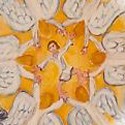
03.21.12 (Adar 27, 5772) The Torah says, ve'ahavta lere'akha kamokha: "you shall love your neighbor as you love yourself" (Lev. 19:18), but this of course logically implies that you are able to love yourself... You can't give away what you don't have, so first things first: do you really love who you are? Do you deeply comprehend your value as God's personal handiwork? Have you quietly pondered the fact that you are an "image bearer" of the Divine, and therefore sacredness is part of the very core of your being?
כִּי־אַתָּה קָנִיתָ כִלְיתָי
תְּסֻכֵּנִי בְּבֶטֶן אִמִּי
אוֹדְךָ עַל כִּי נוֹרָאוֹת נִפְלֵיתִי
נִפְלָאִים מַעֲשֶׂיךָ
וְנַפְשִׁי ידַעַת מְאד
ki · at·tah · ka·ni·ta · khil·yo·tai
te·su·kei·ni · be·ve·ten · im·mi;
o·de·kha · al · ki · no·ra·ot · nif·lei·ti
nif·la·im · ma·a·se·kha
ve·naf·shi · yo·da·at · me·od

"For You possessed my inward heart;
you covered me in my mother's womb.
I thank You, for I am fearfully and wonderfully made.
Wonderful are your works;
my soul knows it very well."
(Psalm 139:13-14)

This great passage plainly states that God Himself personally made you, and indeed, even the innermost part of your being (i.e., kilyah: כִּלְיָה), that is, your "inward heart," comes directly from His creative power and glory. The LORD covered you with His glory "as a sukkah" in the womb, and wove you together according to His plans and purposes (Jer. 29:11). Please take a moment to let that truth sink in. Every part of you - your body, soul, and your spirit - is the direct result of the sovereign intervention, the invincible will, the good purposes, the brilliant design, the redeeming love, the tender mercies, the infinite compassion, and the inimitable glory of the LORD God of Israel. The LORD breathed into you the "breath of life" (i.e., nishmat chayim: נִשְׁמַת חַיִּים) so that you could be a living soul. You are fearfully and wonderfully made because God's fingerprints are all over who you are.
Some people might worry that the thought of loving yourself is dangerous, since it may lead to selfishness and indulgence. However, the Biblical idea of "loving yourself" does not refer to narcissism or to a self-absorbed state of the soul. Loving yourself doesn't mean that you are "in love with yourself," but rather that you respect and honor who you are before the Living God, and therefore self love is connected with yirat Adonai - the fear of the LORD. The problem with the narcissist is not that he loves himself too much, but rather too little, since he regards his self as the proper object of his affection and worship and thereby robs himself of the Highest... The self or the ego, however, when absolutized, makes for a petty character indeed, and love turned inward becomes dreadful soul sickness...
Negatively stated, loving yourself means refusing to desecrate, demean, or otherwise abuse yourself, since self abuse always leads to abusing others (i.e., "hurt people hurt people"). Positively stated, loving yourself is bound up with the "golden rule" of Yeshua - "Do unto others as you would have done unto you" (i.e., regard others as you would like to be regarded). Loving yourself is therefore a categorical imperative because it esteems each human being (including yourself) as an end in itself - and not as a means to an end. This means that abusing others (including yourself) is forbidden because it disparages and denies the image of God. Debasing yourself by regarding yourself as worthless, hopeless, and so on, is therefore truly sinful, since it negates the sacredness of who you are and corrupts and defiles your vision of others. Self-abuse ultimately is an insult to God Himself, since it mocks your identity and impugns His handiwork. We must be very careful how we treat ourselves, since how we do so will be part of our judgment, too.
The Miracle of a New Heart...
The genuine ability to love yourself properly is a gift from God Himself - a miracle of healing and salvation given in the gospel... As mentioned above, the Torah commands us to love others as we love ourselves (Lev. 19:18), but notice that during the Passover seder before his crucifixion, Yeshua gave his friends "a new commandment" (מִצְוָה חֲדָשָׁה), namely, to love others as He loves us (John 13:34). The focal point therefore changes. Because of the love of Yeshua for us, we are able to forget the shame of our past and to experience God's complete acceptance of who we are - faults and all... The Lamb of God not only removes the shame of our sins, but He also imparts to us a new heart and a new spirit (lev chadash v'ruach chadasha) so that are able to keep the Torah's commandment to love others. We are able to love ourselves and others only because God first loves us (1 John 4:19).
מִצְוָה חֲדָשָׁה אֲנִי נוֹתֵן לָכֶם
אֶהֱבוּ זֶה אֶת זֶה כְּמוֹ שֶׁאָהַבְתִּי אֶתְכֶם
כָּךְ גָּם אַתֶּם אֶהֱבוּ זֶה אֶת זֶה
mitz·vah · cha·da·shah · a·ni · no·ten · la·khem
e·he·vu · zeh · et · zeh · ke·mo · she·a·hav·ti · et·khem
kakh · gam · a·tem · e·he·vu · zeh · et · zeh

"A new commandment I give unto you,
that you love one another, just as I have loved you,
you also are to love one another."
(John 13:34)
᾽Εντολὴν καινὴν δίδωμι ὑμῖν,
ἵνα ἀγαπᾶτε ἀλλήλους, καθὼς ἠγάπησα ὑμᾶς
ἵνα καὶ ὑμεῖς ἀγαπᾶτε ἀλλήλους.
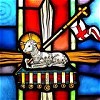
Download Hebrew Study Card
Because you are infinitely valuable to God, your life truly matters, and that logically implies that other people's lives matter, too. Our cynical and corrupt age knows precious little about the fear of the LORD precisely because it refuses to believe that people have infinite worth before God. Love and judgment are therefore parallel concepts. The judgment of God ultimately comes from God's loving correction: Because God loves sinners, he seeks to awaken them, to call them home, and to reveal to them their great worth.
May it please the LORD to impart to each of us a profound respect for the gift and sanctity of our individual lives, and above all may God help us to believe in his love as revealed in the gospel message.... May we love others as Yeshua loved us. Amen.
Korban Chai - קָרְבָּן חַי
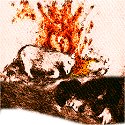
03.21.12 (Adar 27, 5772) The Torah states that three parts of the sacrificial animal must always be "turned to smoke" (i.e., burned), namely, the fat (i.e., chelev: חֶלֶב), the kidneys (i.e., kilyah: כִּלְיָה), and the lobe of the liver (i.e., kaved: כָּבֵד). The fat symbolizes the "rise" of the flesh (and is therefore somewhat analogous to chametz (leaven) that is forbidden during Passover); the kidneys were metaphorically thought to be the source of the desires and emotions, while the liver (the heaviest of the organs) was thought to be the source of pride, anger, and the will. All three of these essential internal organs were to be completely burned on the altar as a sign that the inner parts of the "flesh" must be entirely destroyed. Clearly, God calls for the whole person to come to Him - including all our lusts, emotional longings, and pride....
Followers of Yeshua are invited to take up the cross by becoming a "living sacrifice." We cannot do this in our own flesh strength, however, since an acceptable offering upon the altar of the LORD must be "defect free," and it is the flesh itself that is turned to smoke upon the altar. No, we take up the cross by accepting its message for our lives - and by surrendering ourselves to the finished work of Yeshua performed on our behalf. It is His cross that saves us, and it is from His cross we can hear, "It is finished." We receive the gift of the Spirit through the "great exchange" that comes from drawing near to the altar of Yeshua, our Great High Priest of the New Covenant.
 |
Leviticus and Yeshua...

[ Note that the Book of Leviticus is always read during the season of Passover. The life is in the blood - of Yeshua the Lamb of God! ]
03.20.12 (Adar 26, 5772) The Book of Leviticus (ויקרא) is to the Torah what the Book of Hebrews is to the New Testament. Leviticus is both the physical and spiritual center of the Five Books of Moses and comprises its ritual expression. The sages count 246 of the 613 commandments of the Torah in this book (over 40%), and many of the Talmud's discussions regarding ritual purity and holiness are based on it. As I mentioned before, since the vision of the Mishkan (Tabernacle) was the climax of the revelation of the Torah given at Sinai, the Book of Leviticus is the ritual expression of the Torah itself... "For the life of the flesh is in the blood, and I have given it for you on the altar to make atonement for your souls, for it is the blood that makes atonement (kapparah) by the life" (Lev. 17:11).
Unlike narrative portions of the other books of the Torah, the Book of Leviticus begins as a direct message from God to Moses, "calling out" (vayikra) the way to draw close to the LORD by means of the sacrificial system. It is noteworthy that throughout the book, only the sacred name of the LORD (יהוה) is used in connection with sacrificial offerings, never the name Elohim (אֱלהִים). This suggests that offerings were given to draw us near to experience God's compassion rather than to appease His anger.... In other words, the Name of the LORD represents salvation (i.e., yeshuah: יְשׁוּעָה) and healing for the sinner, not God's judgment. Indeed, the word korban (קָרְבָּן), often translated as "sacrifice" or "offering," comes from a root word karov (קָרַב) that means to "draw close" or "to come near." All those who who approached God through faith in the efficacy of the shed blood of sacrifice were enabled to draw near for healing and life...
Note that the word in the ancient Greek translation of the Torah (called the Septuagint) that was selected to translate the Hebrew word kapporet (i.e., "mercy seat") is hilasterion (ἱλαστήριον), sometimes translated "propitiation." The New Testament picks up this usage in Romans 3:25: "God put forward Yeshua as a propitiation (ἱλαστήριον) through faith in His blood." In other words, the shedding of Yeshua's blood - represented by His Passion upon the cross - was "presented" upon the Heavenly Kapporet, before the very Throne of God Himself for our atoning sacrifice (i.e., kapparah: כַּפָּרָה) before God.
Note: For more on this subject, see the article, "Leviticus and Yeshua."
 |
Hating What is Evil....
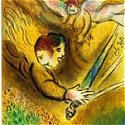
03.20.12 (Adar 26, 5772) Since the human mind necessarily must make distinctions to function intelligibly, it is psychologically impossible for us not to make various judgments in our daily lives. In effect, every day we make decisions regarding good and evil, and therefore every day we are deciding what we love and what we hate. The issue is not whether we love or whether we hate, but what we love and what we hate.
יִרְאַת יְהוָה שְׂנאת רָע
גֵּאָה וְגָאוֹן וְדֶרֶךְ רָע
וּפִי תַהְפֻּכוֹת שָׂנֵאתִי
yir·at · Adonai · se·not · ra,
ge·ah · ve·ga·on · ve·de·rekh · ra
u·fi · tah·pu·khot · sa·nei·ti

"The fear of the LORD is hatred of evil.
Pride and arrogance and the way of evil
and perverted speech I hate."
(Prov. 8:13)

The Scriptures do not play fast and loose on this issue. Despite the world system that falsely claims that values are "relative" and a matter of personal preference, the Spirit of Truth cries out: "Woe to those who call evil good and good evil, who put darkness for light and light for darkness, who put bitter for sweet and sweet for bitter! Woe to those who are wise in their own eyes, and shrewd in their own sight" (Isa. 5:20-21). "There are six things that the LORD hates, seven that are an abomination to him: haughty eyes, a lying tongue, and hands that shed innocent blood, a heart that devises wicked plans, feet that make haste to run to evil, a false witness who breathes out lies, and one who sows discord among brothers" (Prov. 6:16-19). "I hate and abhor lying, but I love Your law" (Psalm 119:163).
We need to test ourselves. If your opposition to evil seems to be growing weak, it may be a sign that your love for God is growing weak as well... It is never wrong to abhor evil, and indeed, the wicked are identified precisely as those who refuse to do this very thing, because inwardly they love darkness and desire the supposed "liberty" to define what is good in their own terms. The Torah, however, makes a direct connection between hating others and being indifferent regarding their spiritual well-being: "You shall not hate your brother in your heart, but you shall reason frankly (i.e., reprove, argue, rebuke, judge, challenge) your neighbor, lest you incur sin because of him... You shall love neighbor as yourself: I am the LORD" (Lev. 19:17-18). If you really love your neighbor, you will care enough to encourage him turn to God for life and healing.
Again, the issue here is not whether we love or whether we hate, but what we love and what we hate. Pride is the essence of sin because it claims to be able to define good in reference to the selfish ego alone, refusing to acknowledge transcendental moral authority. Yeshua, however, gave us spiritual contraries: "No one can serve two masters, for either he will hate the one and love the other, or he will be devoted to the one and despise the other. You cannot serve God and mammon" (Matt. 6:24).
לְךָ יָאֶה אֲדנֵינוּ וֵאלהֵינוּ
לְקַבֵּל אֶת הַכָּבוֹד וְהַיְקָר וְהַגְּבוּרָה
כִּי אתָּא בָּרָאתָ הַכּל
וּבִרְצוֹנְךָ הָיוּ וְנִבְרְאוֹ
le·kha · ya·eh · a·do·nei·nu · ve·lo·hei·nu
le·ka·bel · et · hak-ka·vod · ve'ha-ye·kar · ve'ha-ge·vu·rah
ki · at·tah · ba·ra·ta · ha-kol
u·vir·tzon·kha · ha·yu · ve'niv·re·u

"You are worthy, O Lord and our God,
to receive the glory and the honor and the power:
for You have created all things,
and for thy pleasure they are and were created"
(Rev. 4:11)

Hebrew Study Card
Contrary to the philosophy of this fallen world, it is the essence of love to hate what is evil; just as it is hateful to be "tolerant" of what is wicked... Followers of Yeshua are called to love the truth and abhor the lie. Tolerating sin in a world ripe for judgment is a tacit form of "collaboration" with the enemy... Indeed, the only thing regarded as intolerable in the devil's world is the objection that people have a supposed "liberty" to sin. But the LORD is clear on this point: those who call evil good and good evil are as good as dead... Therefore we are enjoined: "O you who love the LORD, hate evil" (Psalm 97:10). Yes, hate what is evil and love what is good (Amos 5:15). The connection between loving God and hating evil is repeated in the New Testament: "Let your love be genuine (ἀνυπόκριτος, without a "mask" put on): abhor what is evil; cling to what is good (Rom. 12:9). If we truly love the LORD, let us walk in the awe of His great Name by hating what is evil....
 |
Bruised Reeds of Hope...
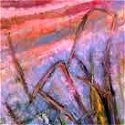
03.19.12 (Adar 25, 5772) Of the Messiah it is written, "A bruised reed shall he not break, and the smoking flax shall he not quench" (Isa. 42:3)... People conscious of their feebleness and who have been crushed because of it are likened to "bruised reeds," and he [the Messiah, the Savior] shall bring no injury to them... As it is written, "The LORD is near to the brokenhearted (נִשְׁבְּרֵי־לֵב) and saves the crushed in spirit." Indeed, the LORD binds up the broken of heart and gives liberty to those in bondage (Isa. 61:1). "A smoking flax shall he not quench" -- neither will the LORD snuff out an unsteady flame ready to expire, but will tend to it with special oil to cause it to burn more brightly.
קָרוֹב יְהוָה לְנִשְׁבְּרֵי־לֵב
וְאֶת־דַּכְּאֵי־רוּחַ יוֹשִׁיעַ
ka·rov · Adonai · le·nish·be·rei · lev
ve·et · dak·ei · ru·ach · yo·shi·a

"The LORD is near to the brokenhearted
and saves the crushed in spirit"
(Psalm 34:18)

Download Hebrew Study Card
The Spirit of the LORD is always saying, "My grace is sufficient for you, for my power is made perfect in weakness" (2 Cor. 12:9). God doesn't need our religious acts of service, our worship, our prayers, or our approval - though of course we desperately need Him... Prayer is a mirror of the heart; we either come to God in our emptiness, our brokenness, and in real humility, or we are just playing religious games. Those who truly call upon the LORD understand their radical need for deliverance, and those who stand before Him will say, "Woe is me, for I am ruined..." (Isa. 6:5). As Yeshua said, "Everyone who exalts himself will be humbled, but the one who humbles himself will be exalted" (Luke 18:14).
We are all wounded and bruised people, and therefore we should extend kindness and compassion to one another, despite our failures and defects of character. We should take the risk and reach out. Of the Messiah it is written, "A bruised reed shall he not break...", meaning that he sought to heal those crushed by the blows of this fallen world. "The LORD is near to the brokenhearted and saves the crushed in spirit," and therefore He is in the midst of the community of the hurting, the forgotten, and the rejected...
 |
The Coming Day of Retribution
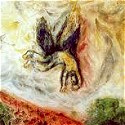
03.19.12 (Adar 25, 5772) The Scriptures are clear that God will exact retribution upon those who defy His authority and who spurn the salvation He has given in Yeshua the Messiah and Savior of the world. "Do not be deceived: God is not mocked, for whatever one sows, that will he also reap" (Gal. 6:7). It is a terrible thought that those who consciously repudiate God and abandon themselves to their sinful urges will suffer middah keneged middah ("like for like") judgment by suffering divine repudiation and abandonment.
Consider Paul's words of consolation spoken to those who were being oppressed by the ungodly: "God considers it just to repay with affliction those who afflict you, and to grant relief to you who are afflicted as well as to us, when Yeshua our LORD is revealed from heaven with His mighty angels in flaming fire, inflicting retribution (ἐκδίκησις) on those who do not know God and on those who do not obey the message of our Lord. They will suffer the justice (δίκην) of eternal destruction, away from the face of the Lord and from the glory of his strength (ἀπὸ τῆς δόξης τῆς ἰσχύος αὐτοῦ), when He comes on that day to be glorified in His people, and to be marveled at among all who have believed" (2 Thess. 1:5-10). There is a "zero hour" coming when the world will be tested by fire...
כִּי־הִנֵּה הַיּוֹם בָּא בּעֵר כַּתַּנּוּר
וְהָיוּ כָל־זֵדִים וְכָל־עשֵׂה רִשְׁעָה קַשׁ
וְלִהַט אתָם הַיּוֹם הַבָּא אָמַר יְהוָה צְבָאוֹת
אֲשֶׁר לא־יַעֲזֹב לָהֶם שׁרֶשׁ וְעָנָף
ki · hin·neh · ha·yom · ba · bo·er · kat·tan·nur
ve·ha·yu · khol · ze·dim · ve·khol · o·seh · risha' · kash
ve·likh·at · o·tam · ha·yom · ha·ba, · a·mar · Adonai · Tze·va·ot
a·sher · lo · ya·a·zov · la·hem · sho·resh · ve·a·naf

"For behold, the day comes, burning like an oven,
when all the arrogant and all evildoers will be stubble.
And the day that is coming shall set them ablaze, says the LORD of hosts,
so that it will leave them neither root nor branch."
(Malachi 4:1)

And again, "For behold, the LORD will come in fire, and his chariots like the whirlwind, to render his anger in fury, and his rebuke with flames of fire. For by fire will the LORD enter into judgment, and by his sword, with all flesh; and those slain by the LORD shall be many" (Isa. 66:15-16). The proud and mighty in this age, the politicians, the powerful, the rich, shall soon be rendered utterly powerless -- as stubble cannot resist the fire, so they shall be utterly consumed. There shall remain no root nor branch -- and therefore there will be no hope for them to be revived -- since the Day of the LORD is the Day of Judgment... For those who love God, however, the Day of the LORD will be blessed: "But for you who fear my name, the sun of righteousness (שֶׁמֶשׁ צְדָקָה) shall rise with healing in its wings. You shall go out leaping like calves from the stall" (Mal. 4:2).
The so-called "wisdom of this world" (σοφία τοῦ κόσμου) is folly before God (1 Cor. 3:19). The Spirit of God warns those who imbibe the sophistry of the world and its spurious ideology: "Woe to those who call evil good and good evil, who put darkness for light and light for darkness, who put bitter for sweet and sweet for bitter! Woe to those who are wise in their own eyes, and shrewd in their own sight! Woe to those who are heroes at drinking wine, and valiant men in mixing strong drink, who acquit the guilty for a bribe, and deprive the innocent of his right! Therefore, as the tongue of fire devours the stubble, and as dry grass sinks down in the flame, so their root will be as rottenness, and their blossom go up like dust; for they have rejected the law of the LORD of hosts (תּוֹרַת יְהוָה צְבָאוֹת), and they have despised the word of the Holy One of Israel" (Isa. 5:20-24).
As Charles Spurgeon once said, "We are not sent forth by our Master with this kind of general commission -- "As you shall think in your heart and invent in your head as you march on, so preach. Keep abreast of the times. Whatever the people want to hear, tell them that, and they shall be saved." Verily, we read not so. There is something definite in the Bible.... revealed as infallible fact, which must be believed, the opposite of which is deadly error, and comes from the father of lies."
We find great comfort when we understand that the LORD God Almighty will soon intervene to put an end to the madness of this evil age... Soon and very soon may we see our King Yeshua, who will finally set all things right and deal with the those who spurn His rule (Psalm 2:8-9; 3:7; Luke 19:27, 2 Thess. 1:5-9). Meanwhile, may the LORD God of Israel, blessed be He, strengthen us and make us people of real conviction, who seek to serve God rather than to pander to mere men (Gal. 1:10; Psalm 118:6). Amen.
 |
Parashat Vayikra - ויקרא

[ Note that the Book of Leviticus is always read during the season of Passover. The life is in the blood - of Yeshua the Lamb of God! ]
03.18.12 (Adar 24, 5772) The Torah portion for this week is Vayikra ("and He called"), the very first section from the Book of Leviticus. In Jewish tradition, the Book of Leviticus is sometimes called the "Book of Sacrifices" since it deals largely with the various offerings brought to the LORD for sacrificial purposes in the Mishkan (Tabernacle). Over 40 percent of all of the Torah's commandments are found in this central book of the Scriptures. As I mentioned before, since the revelation of the Mishkan (Tabernacle) was the climax of the giving of the Torah at Sinai, so the Book of Leviticus (Vayikra) is the climax of its ritual expression: "For the life of the flesh is in the blood, and I have given it for you on the altar to make atonement for your souls, for it is the blood that makes atonement (kapparah) by the life" (Lev. 17:11).
It is an age-old Jewish custom to begin teaching young children the Torah beginning with Vayikra because they, like the sacrifices themselves, are considered pure. The sage known as the Kli Yakar states that this is one of the reasons why the Aleph (א) in Vayikra (ויקרא) is written very small in the Torah scroll. Let these teachings be the beginning, like the letter Aleph, which is the beginning of the Aleph-Bet. When we humble ourselves as little children, God will reveal His truth to us.
 |
Other sages reasoned that Moses' humility (i.e., anavah: עֲנָוָה) was such that he first waited for the LORD to call him into the Mishkan (Tabernacle), despite the fact that God had previously granted him full access to His Presence. The scroll begins with an undersized Aleph as a scribal token of Moses' humility. (The Zohar states that the undersized Aleph signifies that the Tabernacle was not fully complete without the engagement of Israel.) The "spirit of the little Aleph" means that we should always exercise derech eretz -- reverence and politeness -- before the Divine Presence.
The Korban Principle
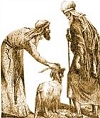
The purpose of the sacrifices was likewise to imbue a sense of humility. At each stage of the offering, the worshipper would see how the animal was slaughtered, dismembered, its blood sprinkled, and its fat burned on the altar -- all for his sake... This is the "korban" principle of "life-for-life." The guilty person would lean his hands upon the head of the animal (semichah) and then say confession (viduy): "I deserve to die instead of this innocent animal, but the LORD mercifully accepts the death of this innocent one in my stead." The worshipper would understand that were it not for chasdei Adonai (חֲסְדֵי יהוה) - the love of the LORD - this should have been his fate. When the LORD saw the shed blood and ascending smoke of the sacrifice, He forgave the sinner based on his faith and teshuvah (repentance). The entire sacrificial system was therefore predicated on God's love that foreshadowed the ultimate sacrifice of Yeshua, the Son of God.
Some of the sages note that the word korban (קָרְבָּן) is often translated "sacrifice" or "offering" (the Greek LXX uses the word δῶρον, "gift"), though it derives from a root (קָרַב) that means to "draw close" or "to come near." Offering a sacrifice in the Tabernacle (and later, at the Temple) was therefore a means of coming close to the LORD in repentance and humility. God gave the sacrificial system as a means to draw near to Him until the Messiah would come as the High Priest of the new covenant....
In ancient Israel there were three "classes" within the structure of Jewish society: the Kohen, the Levite and the Israelite. The Kohen was a physical descendant of Aaron who functioned as a priest of Israel. His primary role was to offer sacrifices on behalf of other Jews (his cousin, the Levite, served as his assistant, helping to maintain the Mishkan, carry vessels, and so on). Only the Kohanim could perform avodah (priestly service) even though originally the firstborn of each family was to function as a priest of Israel. On Yom Kippur, only the High Priest of Israel could offer sacrifice on behalf of all the Jews...
The sacrifice of Yeshua as the Kohen Gadol of the better covenant was given by God the Father on behalf of all those who put their trust in his Son. The Cross of Yeshua represented the kapporet ("mercy seat") of the New Covenant -- and it was there He shed his blood for our everlasting reconciliation to God. We can all draw near to God and be close to Him because of the Korban of Yeshua... Moreoever, when the sacrifice was complete (and Yeshua died), the veil of the Temple -- the parochet that separated the Holy of Holies from the Holy Place -- was rent asunder, thereby granting access to the "throne of grace" (θρόνος τῆς χάριτος) (Heb. 4:16). Because of the High Priestly work of Yeshua, Levitical mediators are no longer necessary (1 Tim. 2:5), and all who trust in the Messiah are called "spiritual kohanim" (1 Pet. 2:5-9). Followers of Yeshua have an altar whereof those who attempt to serve in the older system are unable to eat (Heb. 13:10).
Note that we are part of the priesthood after the order of Malki-Tzedek (מַלְכִּי־צֶדֶק), the "King of Righteousness." Yeshua is Adonai Tzidkenu - יְהוָה צִדְקֵנו - the LORD our Righteousness. We do not account ourselves worthy based on our personal merit, but solely on account of the finished avodah of Yeshua our LORD. Since we have access to the "throne of grace," and the word grace (χαρις) is related to the word joy (χαρα), we are called to offer sacrifices of praise. We are called to be Korban Chai -- Living Sacrifices -- on behalf of the ongoing ministry of our Messiah who urges all people to repent and draw near to the Father through Him. Because of the grace of God given to us in Yeshua, we are "briah chadashah" (בְּרִיאָה חֲדָשָׁה) - new creations in the Messiah!
 |

[ The following entry is related to the Biblical New Year (and the month of Nisan), which begins Friday, March 23rd at sundown this year (i.e, this coming Shabbat)... ]
03.18.12 (Adar 24, 5772) The world runs on a "clock" that operates under assumptions that are different than those revealed in the Scriptures.... The "wisdom of this world" (σοφία τοῦ κόσμου τούτου) is the prevailing cultural spirit that suppresses the reality of God's Presence and truth. Such "wisdom" is regarded as foolishness before God, and God has promised to "seize the so-called wise in their own craftiness" (1 Cor. 3:19). The life of faith, on the other hand, sees what is invisible. Faith (emunah) apprehends "the substance (ὑπόστασις) of things hoped for, the assurance (ἔλεγχος, conviction, "correction," "argument," i.e., tokhachat: תוֹכַחַת) of things not seen" (Heb 11:1). As it is written, the heart of faith "looks not to the things that are seen but to the things that are unseen. For the things that are seen are transient, but the things that are unseen are eternal" (2 Cor. 4:18).
The Biblical New Year (i.e., Rosh Chodashim) begins Friday, March 23rd at sundown this year, and therefore this coming Sabbath is called Shabbat HaChodesh (שַׁבַּת הַקּדֶשׁ), the "Sabbath of the Month" (of Nisan). During this Sabbath we honor this coming New Year time by reading an additional passage from the Torah concerning the sanctification of the new moon (Exod. 12:1-20), and we spiritually prepare for the season by studying the laws of Passover and the coming spring holidays:

According to the sages, the very first commandment given to the Jewish people (as a nation) was the commandment to sanctify the new moon of spring, in anticipation of the coming Passover (Exod. 12:2). This commandment reveals that it is our responsibility to sanctify (i.e., observe) Biblical time in general. In other words, when we observe "the beginning of months," we are acknowledging that time itself is rooted in the Biblical calendar with its divinely inspired cycle of festivals (i.e., the moedim). This year the Biblical New Year begins on Friday, March 23 at sundown, and therefore Passover begins exactly two week weeks later, on Friday, April 6th (at sundown):
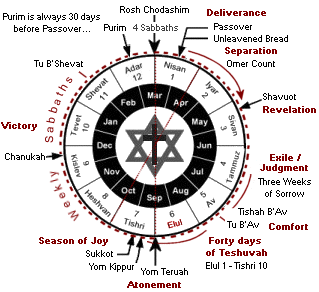 |
Originally Rosh Chodashim was simply called the "first month" because it marked the month of the Exodus and the other months were named in relation to it, similar to the days of the week in the Hebrew calendar (i.e., the first day, the second day...). Later it was called Chodesh Ha-Aviv (חדֶשׁ הָאָבִיב) - "the springtime month" (because the calendar is reset in the spring) and later still as Nisan (נִיסָן), to recall God's faithfulness after the Babylonian Exile (Neh. 2:1; Esther 3:7). So important is this month that the Jewish sage Rabbi Moshe ben Nachman (Ramban) wrote regarding the commandment to observe Rosh Chodashim:
"The verses (Exod. 12:1-2) mean that this month should be counted first, and beginning with it, the count should proceed to the second, the third, and so on, till the end of the sequence with the twelfth month. In this way, this month should be a commemoration of the Great Miracle (i.e., our Redemption), and every time we mention the months, the Miracle will be alluded to. It is for that reason that the months do not have names in the Torah, but rather they are identified by number."
The word Nisan might come from either the word nitzan (נִצָּן), meaning "bud" (Song 2:12), or the word nissim (נִסִּים) meaning "miracles," both of which suggest physical and spiritual resurrection in our lives. Others think the word comes from the verb nus (נוּס), meaning "to flee," both in relation to Israel's flight from Egypt and Egypt's flight from Israel (i.e., when the pursuing Egyptian cavalry fled (נָסִים) before the sea closed upon them (Exod. 14:25, 27). We also see this usage in the verse: "The wicked flee (נָסוּ) when no one pursues, but the righteous are bold as a lion" (Prov. 28:1). The devil's power is found in the lie. If he can make you afraid, you will not think clearly. Establishing your faith in the truth will embolden you to deal with the lies and distortions that are intended to enslave you in fear. As Yeshua said, the truth will set you free (John 8:32).
Rosh Chodashim Blessing
The new moon of Nisan is the most significant of the Jewish calendar since it initiates the first month of the Biblical Calendar - and therefore represents the Biblical "New Year's Day." Of all the various Rosh Chodesh celebrations, then, Rosh Chodesh Nisan is foundational, since it presents the starting point for the cycle of the yearly festivals (mo'edim) that reveal prophetic truths about the LORD God of Israel and His beloved Son, Yeshua the Mashiach, blessed be He. Here is a simplified blessing you can recite to mark this special time:
יְהִי רָצוֹן מִלְּפָנֵיךָ יהוה אֱלהֵינוּ וֵאלהֵי אֲבוֹתֵינוּ
שֶׁתְּחַדֵּשׁ עָלֵינוּ חדֶשׁ טוֹב בַּאֲדנֵינוּ יֵשׁוּעַ הַמָּשִׁיחַ אָמֵן
ye·hi · ra·tzon · mil·fa·ne·kha · Adonai · E·lo·hei·nu · ve·lo·hei · a·vo·tei·nu
she·te·cha·desh · a·lei·nu · cho·desh · tov · ba'a·do·nei·nu · Ye·shu·a · ha·ma·shi·ach · A·men

"May it be Your will, LORD our God and God of our fathers,
that you renew for us a good month in our Lord Yeshua the Messiah. Amen."

Download Study Card
Thanking God for the Appointed Times
As we begin to prepare our hearts for Passover, it is surely appropriate to thank the LORD God of Israel for the holidays as a revelation of Yeshua our Messiah at this time:
בָּרוּךְ אַתָּה יהוה אֱלהֵנוּ מֶלֶךְ הָעוֹלָם
אֲשֶׁר נָתַן לָנוּ חַגִּים חֻקּוֹת וּמוֹעֲדִים לְשִׂמְחָה
לִכְבוֹד יֵשׁוּעַ הַמָּשִׁיחַ אֲדוֹנֵינוּ ־ אוֹר הָעוֹלָם
ba·rukh · at·tah · Adonai · E·lo·he·nu · me·lekh · ha·o·lam,
a·sher · na·tan · la·nu · chag·gim, · chuk·kot, · u'mo·a·dim · le·sim·chah,
likh·vod · Ye·shu·a · ha·ma·shi·ach · A·do·ne·nu - ohr · ha·o·lam

"Blessed art You, LORD our God, King of the universe,
who has given to us holidays, customs, and seasons of happiness,
for the glory of our Lord Yeshua the Messiah - the Light of the world"

Download Study Card
To a good year in our Messiah!
The following prayer is customarily said during Rosh Hashanah, but it is equally applicable for the New Year of Nisan and the Season of Passover:
יְהִי רָצוֹן מִלְּפָנֶיךָ יהוה אֱלהֵינוּ
וֵאלהֵי אֲבוֹתֵינוּ
שֶׁתְּחַדֵּשׁ עָלֵינוּ שָׁנָה טוֹבָה וּמְתוּקָה
בַּאֲדנֵינוּ יֵשׁוּעַ הַמָּשִׁיחַ אמן
ye·hi · ra·tzon · mil·fa·ne·kha, · Adonai · E·lo·hei·nu
ve·lo·hei · a·vo·tei·nu,
she·te·cha·desh · a·lei·nu · sha·nah · to·vah · u·me·tu·kah
ba·A·do·nei·nu · Ye·shu·a · ha·Ma·shi·ach [a·men]

"May it be your will, LORD our God
and God of our fathers,
that you renew for us a good and sweet year
in our Lord Yeshua the Messiah." [Amen]
Download Study Card
Shanah Tovah and Chodesh tov, chaverim!
Shabbat Table Talk (ויקהל־פקודי)

[ This week we have a "double portion" of Torah: parashat Vayakhel and Pekudei. Please read the Torah portions to "find your place" here. ]
03.16.12 (Adar 22, 5772) This week we have a "double portion" of Torah. The first portion (i.e., Vayakhel) provides the account of the building of the Mishkan (i.e., Tabernacle), while the second portion (i.e., Pekudei) concludes with the Divine Presence filling the Tabernacle "on the first month of the second year, on the first day of the month," exactly one year after God had instituted the Biblical calendar (Exod. 12:2; 40:17). With the priesthood established and the Tabernacle located at the center of the camp, the Book of Exodus comes to a close, as the Israelites were finally ready to embark on their journey back to the Promised Land with the LORD's Presence in their midst....
You can download the Shabbat Table Talks for both these portions here:
Notice how the Tabernacle - the apex of the revelation given at Sinai - constantly revealed the sacrifice of the Lamb of God... The "korban tamid" (תָּמִידקָרְבַּן) was the sacrifice of a lamb every morning and afternoon upon the copper altar in the outer court -- the central sacrifice of the Tabernacle. Along with it, matzah and wine offering were required, thereby revealing the true Passover Lamb of God and his sacrifice for us (Exod. 29:38-42). That the lamb was offered twice daily hints at its two applications - the first concerning the great deliverance from Egypt by the blood of the lamb, and the second concerning the even greater deliverance given through Yeshua, the true Lamb of God. Note also that the constant sacrifice of the lamb required that the fire at the altar would never be extinguished. By extension, "the first and foremost task is faithfully to care for the inner fire" (Nouwen). Thank God that the fire that daily needs tending comes from the Spirit of God within us!
Since we are finishing the Book of Exodus this week, it might be helpful to take a moment to contextualize its place in light of the other books of the Torah. The Book of Genesis (בְּרֵאשִׁית) is truly the "beginning," the "root," and the "seedbed" of all the subsequent Scriptures - including the message of the gospel and the revelation of the New Testament. In Genesis we see the creation and ruin of man through sin, but we take hold of the promise of deliverance through the coming Seed of the woman. In the Book of Exodus (שְׁמוֹת) we see God's powerful redemption secured through the blood of the Lamb, a sacrifice that led to the revelation at Sinai that was enshrined in the daily (tamid) sacrifice of the lamb offered at the Mishkan (Tabernacle). The revelation of the altar was the center of the divine revelation at Sinai and the essence of the Torah. In the Book of Leviticus (וַיִּקְרָא) we encounter communion and atonement in the holy sanctuary which prefigured the work of Yeshua as our Mediator and High Priest of the New Covenant. In the Book of Numbers (בַּמִדְבַּר) we experienced the faithful leading of God through desert places, and discovered the unpardonable sin of unbelief. Finally in the Book of Deuteronomy (הַדְּבָרִים) we are renewed by God's faithfulness before we take hold of our inheritance under the leadership of Joshua, a picture of Yeshua as the Captain of Salvation. Ultimately, the concluding book of the Bible, the Book of Revelation, serves as a climactic "final chapter" of the story that began in Genesis, where the Tree of Life (עֵץ הַחַיִּים) is restored to the midst of the paradise of God, and the presence of sin and death are forever eradicated.
I realize this quick summary greatly simplifies things, but hopefully this outline will help us see the "big picture" of the Torah. Of course we will review the theme of Exodus during the Passover Seder (and also during the Torah readings for Passover week), but after this Sabbath the Torah reading schedule begins with the Book of Leviticus.
As we finish reading the Book of Exodus for another year, it is customary to chant the words chazak, chazak, venitchazek (חָזַק חָזַק וְנִתְחַזֵּק) - "be strong, be strong - and let us be strengthened!" Shabbat Shalom Chaverim! "May grace and peace be multiplied to you in the knowledge of God and of Yeshua our Lord (יֵשׁוּעַ אֲדנֵינוּ), blessed be He forever. Amen. Trust in His love today; accept that you, too, are accepted because of what great things He has done... Magnify His Name together with me!
Note: This Shabbat is also called "Shabbat Parah" because we read about the Red Heifer offering (i.e., Num. 19:1-22) in anticipation of the coming holiday of Passover. This Red Heifer offering is regarded as a paradox to most Jewish thinkers, since the one who offers it becomes ritually impure, while those who are sprinkled with water mixed with its ashes are made clean from the impurity of death (there is a somewhat similar procedure for cleansing the leper as described in parashat Tzara'at). The ritual is called "chok" within the Jewish tradition, which means that it makes no rational sense, though we understand it to picture the great exchange we have through the sacrificial death of Yeshua our Savior "outside of the camp" (2 Cor. 5:21).
 |
Numbering our days...
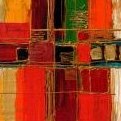
03.16.12 (Adar 22, 5772) Spiritual danger is just as real as physical danger, though most people pretend it isn't because it isn't easily seen. The real dangers of life are not vulnerability to crime or some accident, however, but rather susceptibility to despair, the tendency to put off repentance, and the possibility of not dying well.... It is a great danger to walk through life asleep only to be jolted awake upon the day of death. "The greatest danger is that one does not discover, that one is not always discovering, that one is in danger" (Kierkegaard). Danger of what? Of wasting your life with trifles and vanities; of never learning how to truly love or to be loved; of becoming numb, unfeeling, and therefore unmoved by your need for God. As C.S. Lewis once wrote, "The safest road to hell is the gradual one - the gentle slope, soft underfoot, without sudden turnings, without milestones, without signposts." The spell of the devil is real danger, friends...
לִמְנוֹת יָמֵינוּ כֵּן הוֹדַע
וְנָבִא לְבַב חָכְמָה
lim·not · ya·me·nu · ken · ho·da
ve·na·vi · le·vav · chokh·mah

"Teach us to number our days
that we may get a heart of wisdom."
(Psalm 90:12)

Hebrew Study Card
Literally:
"to number our days rightly, make us know,
and we will enter into a heart of wisdom."
Moses' petition surely is not the request that we are enabled to literally count the remaining days of our lives (as if that would help us, anyway), since God does not disclose the day of one's death, nor should such information be sought... On the contrary, to "number our days" means first of all to account them in relation to Eternity and to esteem them as both infinitely vain and infinitely precious. In other words, Moses is asking that the LORD God would teach us how to make our days count for eternity, to have a weight of glory that will shine in the world to come. Living in the awareness of both the frailty of life as well as its eternally enduring significance is to acquire a heart of wisdom, since fleeting moments - and what we choose to do with them - are the very means by which we prepare ourselves for the world to come and our future with the LORD. Indeed, this explains why Moses ends his appeal by asking the LORD to establish the work of our hands:
וִיהִי נעַם אֲדנָי אֱלהֵינוּ עָלֵינוּ
וּמַעֲשֵׂה יָדֵינוּ כּוֹנְנָה עָלֵינוּ
וּמַעֲשֵׂה יָדֵינוּ כּוֹנְנֵהוּ
vi·hi · no·am · Adonai · E·lo·he·nu · a·ley·nu
u·ma·a·seh · ya·de·nu · ko·ne·nah · a·ley·nu
u·ma·a·seh · ya·de·nu · ko·ne·ne·hu

"Let the splendor of the Lord our God be upon us,
and establish the work of our hands upon us;
yes, establish the work of our hands!"
(Psalm 90:17)

Despite the frailty and tenuous brevity of our days, may it please the LORD God to shine the power of His radiance upon us, and to establish our works for His praise. May He help us to "number our days" so that we may obtain levav chokhmah (לְבַב חָכְמָה) - a heart of wisdom to live according to His will (James 1:5). Above all else, may the "God of our Lord Yeshua the Messiah, the Father of Glory (אֲבִי הַכָּבוֹד), impart to you a spirit of wisdom and of revelation in the knowledge of Him (רוּחַ הַחָכְמָה וְהֶחָזוֹן לָדַעַת אתוֹ), having the "eyes of your hearts" (ὀφθαλμοὺς τῆς καρδίας) enlightened, that you may know what is the hope to which he has called you" (Eph. 1:17-18). May you be strong, resolute, and fully focused on our LORD, chaverim. Amen.
Cleanse Out the Old Leaven...
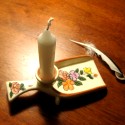
[ Passover will be here in just a few weeks. The first Seder will be Friday night, April 6th; the second Seder (for those living outside of Israel) will be Saturday night, April 7th. ]
03.15.12 (Adar 21, 5772) Preparing for Passover often begins a full month before the holiday arrives, just after the festival of Purim. Since no leavened bread may be eaten during all seven days of Passover, we make a special effort to remove leaven entirely from our homes, in obedience to the Torah's commandment (see Exod. 12:15). This means we clean every room of the house so that all "chametz," or leavened products, are removed. We search for bread crumbs under the cushions of our sofas, our stuffed chairs, in the pockets of our coats and pants, on closet floors, to remove every trace. We also thoroughly clean our stove, oven, refrigerator, and freezer (for a complete list, see this page).
Why are we commanded to search and remove leaven? Because leaven (i.e., chametz: חָמֵץ) represents a corrupting influence, a hidden uncleanness that manipulates purer elements. Like the influence of a small lump of leaven decaying in a batch of dough, "spiritual" leaven functions as an evil impulse within us (i.e., yetzer ra: יֵצֶר רָע) that "puffs up," corrupts and "sours" our inner life. This "yeast in the soul" is essentially pride that manifests itself in idolatrous desires and lusts.
The Apostle Paul instructs, "cleanse out the old leaven (חָמֵץ) that you may be a new lump, just as you really are unleavened. For the Messiah our Passover Lamb has been sacrificed (מָשִׁיחַ זֶבַח פִּסְחֵנוּ). Let us therefore celebrate the festival, not with the old leaven, the leaven of malice and evil, but with the unleavened bread of sincerity and truth (1 Cor. 5:7-8). Note that the Greek uses an imperative verb here (ἐκκαθάρατε): "You cleanse out the old leaven so that you may become a new lump (ἵνα ἦτε νέον φύραμα), since you already are unleavened (ἵνα ἦτε νέον φύραμα) because of what Messiah has done for you." To untangle what this means, it is important to remember that all the "oughts" (i.e., commands) of the New Covenant are directed to the truth of who you are "in the Messiah," that is, by virtue of His connection to you, and not to your former identity before you were saved. If you belong to Yeshua, you are no longer "known according to the flesh" - since that person has passed away - and now you are a "new creation" (בְּרִיָּה חֲדָשָׁה) with a new nature that is able to serve God (2 Cor 5:16-17). Another way to say this is that the imperatives of the New Covenant are always based on its declaratives; you are able to obey because of who you really are in the Messiah. It is solely out of your union with Him that you are able to please God. This is good news, since it's not up to you to do this; you need only to believe in the miracle....
The search for chametz is not unlike the soul searching we do before the fall High Holidays, when we perform chesbon hanefesh (חֶשְׁבּוֹן הַנֶּפֶשׁ) by taking inventory of our spiritual condition before the LORD. In other words, we are commanded to search and remove sources of inner impurity so that we might experience the truth that we area "new lump" - that is, a new substance that is untainted by the sour and rotting influences of our past lives. Since Yeshua has been sacrificed as your Passover Lamb, you are indeed a new creation (בְּרִיָּה חֲדָשָׁה) and are made "unleavened" by the power of the Holy Spirit (2 Cor. 5:17). Therefore we are likewise commanded put away the "old nature" - the yetzer ha'ra - and purge from your life the old influences that inwardly canker you and make you sick. Walk without hypocrisy in the truth of the love of God for your soul.
חָקְרֵנִי אֵל וְדַע לְבָבִי
בְּחָנֵנִי וְדַע שַׂרְעַפָּי
וּרְאֵה אִם־דֶּרֶךְ־עצֶב בִּי
וּנְחֵנִי בְּדֶרֶךְ עוֹלָם
chok·re·ni · el · ve'da · le·va·vi
be·cha·ne·ni · ve'da · sar·a·pai
u·reh · im · de·rekh · o·tzev · bi
u'ne·che·ni · be·de·rekh · o·lam

"Search me, O God, and know my heart!
Test me and know my thoughts.
And see if there be any idolatrous way in me,
and lead me in the way everlasting!"
(Psalm 139:23-24)
δοκίμασόν με ὁ θεός καὶ γνῶθι τὴν καρδίαν μου
ἔτασόν με καὶ γνῶθι τὰς τρίβους μου
καὶ ἰδὲ εἰ ὁδὸς ἀνομίας ἐν ἐμοί
καὶ ὁδήγησόν με ἐν ὁδῷ αἰωνίᾳ (LXX)
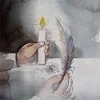
On the night before Passover, a final "ceremonial search" for chametz is performed by candlelight by the entire family. This search is called bedikat chametz (בְּדִיקַת חָמֵץ) and there is an old custom that ten pieces of chametz are to be "hidden" in the rooms before they are searched. If you hide ten and you (or your children) find only nine, just keep searching! The ten pieces remind us of the ten plagues. A feather and a spoon are often used to sweep up the last crumbs of bread in the house, which will then be burned with the other chametz the following morning...
Passover and Freedom...
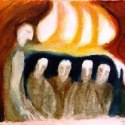
[ Passover will be here in just a few weeks. The first Seder will be Friday night, April 6th; the second Seder (for those living outside of Israel) will be Saturday night, April 7th. ]
03.14.12 (Adar 20, 5772) The Hebrew word for salvation (i.e., yeshuah: יְשׁוּעָה) comes from a root (i.e., yasha: ישׁע) that means to "make wide," to make "broad," "spacious," or "free [from what blocks or holds in bondage]." This is the word used to describe the deliverance of the Jewish people from their bondage in Egypt (Exod. 14:13; Deut. 33:29). The LORD God of Israel is called the Savior (Isa. 45:21] - (i.e., moshia [מוֹשִׁיעַ] - from the same root). The Name of "Jesus" is Yehoshua (יְהוֹשׁוּעַ) in Hebrew, from יְהוָה and יָשַׁע, which means "YHVH is salvation" or "YHVH saves." Passover is all about the salvation of God procured through the sacrificial blood of the lamb...
The sages say that the word "Passover," or Pesach (פֶּסַח), comes from the word "mouth" (i.e., peh: פֶּה) and "speaks" (i.e., sach: סָח), suggesting that during this season we use our mouths to speak of the salvation and greatness of the LORD. Therefore during the seder on Passover night we come together to read the haggadah (הָגַּדָה), a narrative that retells how God has set us free by great signs and wonders - and by the blood of the lamb. God abhors slavery and oppression, and indeed the first commandment reminds us that the LORD delivered us from the "house of bondage" (Exod. 20:2). Ultimately Passover celebrates how God's grace enables us to "leap over" (פּסח) from death to life!
On the Biblical calendar, the holiday of Shavuot (שָׁבוּוֹת) -- sometimes called "Pentecost" -- occurs precisely 49 days after Passover. This implies that we first must experience God's deliverance and then we are enabled to receive greater revelation about Him. This is implied in Hebrew word for "freedom" itself (i.e., cherut: חֵרוּת), which equals 614 in gematria, the same value as the sum of the three words "wisdom" (i.e., chokhmah: חָכְמָה), "discernment" (i.e., binah: בִּינָה), and "knowledge" (i.e., da'at: דַּעַת). The deliverance we have in the Yeshua, the true Lamb of God, leads us to wisdom and revelation about the glory of God through the impartation of the Holy Spirit (Acts 1:8, 2:1-4). The goal of our deliverance from Egypt was the freedom to serve God as His people.
 |
 |
"Love not the world..."

03.14.12 (Adar 20, 5772) When the Bible commands us not to "love the world, nor the things that are in the world" (1 John 2:15), we first need to understand what "the world" means, since the term itself requires definition... In English "the world" may refer to: 1) the physical earth itself; 2) the societies and institutions of human beings in general (i.e., the "world of mankind"); 3) a particular period of human history (i.e., the "ancient world"); 4) a specific sphere of cultural or intellectual pursuit (i.e., the "world of art"); 5) the public at large or in general (i.e., "world news"); 6) the physical universe at large (i.e., the "world and everything in it"), and so on. Because of such wide variety of usage, we need to carefully examine the context of a passage when "the world" appears in our Bibles. After all, the same Bible that commands us not to love the world also says that God loved the world so much that He sacrificed His Son so that the world might be saved in Him (John 3:16-17).
The most common word translated "world" in the New Testament is the Greek word kosmos (κόσμος), which is thought to refer to a "harmonious arrangement," an orderly balance, or a symmetry discerned within or imposed upon the primordial chaos (תהוּ וָבהוּ). The ancient (pagan) Greek philosophers regularly used this term to refer to the pattern or "form" of the physical universe, that is, the "cosmological" order of reality... Hence Plato called the kosmos as a "physical reflection" of reason's order (οὐρανὸς), thereby linking it to the operation of the logos (λόγος) or the Divine Intelligence... Perhaps this explains why the ancient Greek version of the Torah (i.e., the Septuagint, or LXX) used the word kosmos to translate the Hebrew word tzava (צָבָא), the arrangement of the stars and the "heavenly host," thereby suggesting a link between celestial order and God's creative activity (Gen. 2:1). The LORD is therefore called Adonai Tzeva'ot (יְהוָה צְבָאוֹת), the LORD of the hosts (or armies) of heaven as well as Ha-Borei Ha'olam, the Creator of the world (הַבּוֹרֵא הָעוֹלָם). We see a related usage when kosmos was used to translate the Hebrew word for "ornaments" or "jewelry" (עֶדְיָם), implying an "arrangement that beautifies" (Exod. 33:6; 1 Pet. 3:3). The English word "cosmetology" (κοσμητικός) derives from this translation.
In the Greek New Testament, the word kosmos is a general term that refers to the "world" or "sphere" of something, such as the totality of the creation (Acts 17:24; John 17:5), the "kingdom" of men and their [demonic] power structures (Rev. 11:15), the nations of the world (Matt. 5:14, Rom. 1:8, Col. 1:6; 1 John 4:14), the transient stages of human history (1 Cor. 7:31), and so on. The word is also used to earthly possessions and values, what we might describe as "worldliness" or the desire for material possessions, prestige, power, and so on (Mark 8:36; 1 Cor. 1:20) -- as well as the underlying philosophy of life that incites people to live according to these transitory and vain values (James 4:4; 1 John 2:15-17).
In the apostle John's writings, kosmos often represents the collective condition of lost humanity that is in direct opposition to God, a defiant social world characterized by spiritual "darkness" that is ruled by the devil (John 3:16-21; 12:31; 16:11). Yeshua spoke of two basic "worlds" - the spiritual world "above" and the earthly world "below." "You are from below (ἐκ τῶν κάτω), I am from above (ἐκ τῶν ἄνω); you are of this world (ἐκ τούτου τοῦ κόσμου), I am not of this world" (John 8:23). It is important to note that for John, these two worlds are presently active and intersecting in daily experience, and therefore salvation and judgment occur in the present - not in some far-off future state (1 John 2:8; John 3:18). The general outworking of human history is essentially a conflict between the Kingdom of God (מַלְכוּת אֱלהִים) and the kingdom of Satan (John 8:34-6) that is being waged by the "children of darkness" and the "children of light" (Eph. 5:8; Col. 1:13, 1 Thess. 5:5, etc.). Politically speaking, Augustine described the conflict as one between the "City of Man" and the "City of God" (Matt. 11:12). Therefore David asked God to protect him from those who are "set on fire, even the sons of men" (Psalm 57:4) and Yeshua referred to the ruler of this world (ὁ ἄρχων τοῦ κόσμου τούτου) who desired to "eat up his flesh" but who ultimately would be cast out (John 12:31; 14:30). The source of strife, murder, and war, is the spirit that enflames fleshly passions (i.e., hedone: ἡδονή) by creating unrest within the soul (James 4:1-3). Those who are regenerated by the grace of God are "transposed" (μεθίστημι) from the kingdom of darkness into the kingdom of light (Col. 1:13). "Everyone who has been fathered by God conquers the world" (1 John 5:4). Because of the love of God, we overcome the world and its philosophy of death through the victory of the eternal life (חַיֵּי עוֹלָם) we have in Yeshua our LORD (1 Cor. 15:57).
The realm of the "fallen world" -- understood in terms of the "fellowship" (κοινωνία) of darkness -- is something from which we are delivered and of which we are no longer to be enslaved (Col. 1:13). As Yeshua said, "If you belonged to the world, the world would love you as its own" (John 15:19). In other words, we are "in" but not "of" this world (John 17:15), and though we physically coexist with others in this time-space, we are no longer citizens of this fallen world and its underlying value system. We are not to love this world, nor the things this world values, since doing so embraces a philosophy of life that is at war with the Father and contrary to the truth of eternity (1 John 2:16; James 4:4). The fallen world values "the flesh" and the "desire of the eyes" that is patterned according to the "arrogance of life." In other words, it is a "beauty pageant" that esteems others based on their accidental qualities instead of their inner and essential qualities. It values others as means to an end rather than as ends in themselves.... The realm of the flesh is the all-too human, the selfish, the natural, the ordinary, and the tit-for-tat, where love and acceptance are extended in conditional terms (Matt. 5:46-47). In this connection, let me quote from Henri Nouwen regarding slavery to the world and its perverse value system:
At issue here is the question: "To whom do I belong? God or to the world?" Many of my daily preoccupations suggest that I belong more to the world than to God. A little criticism makes me angry, and a little rejection makes me depressed. A little praise raises my spirits, and a little success excites me. It takes very little to raise me up or thrust me down. Often I am like a small boat on the ocean, completely at the mercy of its waves. All the time and energy I spend in keeping some kind of balance and preventing myself from being tipped over and drowning shows that my life is mostly a struggle for survival: not a holy struggle, but an anxious struggle resulting from the mistaken idea that it is the world that defines me.
As long as I keep running about asking: "Do you love me? Do you really love me?" I give all power to the voices of the world and put myself in bondage because the world is filled with "ifs." The world says: "Yes, I love you if you are good-looking, intelligent, and wealthy. I love you if you have a good education, a good job, and good connections. I love you if you produce much, sell much, and buy much." There are endless "ifs" hidden in the world's love. These "ifs" enslave me, since it is impossible to respond adequately to all of them. The world's love is and always will be conditional. As long as I keep looking for my true self in the world of conditional love, I will remain "hooked" to the world - trying, failing, and trying again. It is a world that fosters addictions because what it offers cannot satisfy the deepest craving of my heart." (Return of The Prodigal Son; 42-43)
We see then the connection between worldliness and idolatry, since idolatry essentially involves trying to find your identity, your worth, your satisfaction, and your ultimate fulfillment in the realm of the transitory and the finite rather than in God.... We are (rightly) warned against the vices of "worldliness" and are admonished to abstain from popular culture and its spurious values, but note well that worldliness extends well beyond all this, since it concerns understanding the identity and nature of the person as a whole. The fruit of worldliness is the result of being rooted in this world rather than in God's kingdom. The various desires of the human heart - even the desire for "normal things" like personal happiness in this world - may be regarded as "worldly" if they are devoid of submission to God and His rule. Conversely, even Christian workers may be "worldly" if they base their identity in what they do rather than who they are in the Messiah...
May it please the LORD to keep our hearts from wavering by helping us remember our true identity as beloved His children (1 John 3:1). "If then you have been raised with Messiah, seek the things that are above (τὰ ἄνω ζητεῖτε), where the Messiah is seated at the right hand of God; focus your thoughts on the things above - not on things here on earth - for you have died, and your life has been hidden with Messiah in God. Then when the Messiah, who is your life, appears, you too will appear with him in glory" (Col. 3:1-4).
All of this turns on our faith... If we are spiritually identified with Yeshua, we are "dead" to this age (olam hazeh) and therefore are awakened to a realm that transcends the appeals of carnal flesh (olam habah). We no longer live chayei sha'ah (חַיֵּי שָׁעָה, "fleeting life") but chayei olam (חַיֵּי עוֹלָם, "eternal life"). The aorist verb "you have died" indicates "you have died once for all," that is, that this is a condition granted by the power and agency of God on your behalf. You don't "try to die" to the flesh; you accept what God has done by killing its power over you through Yeshua... You are dead to this world; you are dead to sin's power; you are set free and no longer enslaved to the deception of the worldly matrix, etc. Now you are made alive to an entirely greater and more powerful order and dimension of reality, namely, the spiritual reality that is not disclosed to the vanity of this age. Therefore we are to consciously focus our thoughts (φρονέω) on the hidden reality of God rather than on the temporal world that is passing away: "For we are looking not to the things that are seen but to the things that are unseen. For the things that are seen are transient (i.e., "just for a season," καιρός), but the things that are unseen are eternal" (2 Cor. 4:18).
May the LORD God Almighty help us know who we are in our glorious Savior Yeshua. Amen.
 |
Beginning and End...

[ The following is related to our Torah portion this week, parashat Pekudei. Please read the Torah portion to "find your place" here. ]
03.13.12 (Adar 19, 5772) The final portion of the Book of Exodus (i.e., Pekudei) provides details about the construction of the Tabernacle (מִשְׁכָּן) and its furnishings as well as the special clothing of the priests. At the end of the portion we read, וַיְכַל משֶׁה אֶת־הַמְּלָאכָה / "Moses finished all the work" (Exod. 40:33), a phrase that has the same gematria (numeric value) as bereshit (בְּרֵאשִׁית, "in the beginning"), the very first word of the Torah (Gen. 1:1). This suggests that the very creation of the universe was for the sake of the building of the Tabernacle, and by extension, for the sake of the sacrificial love of God to be demonstrated to all of creation. The Talmud states, "All the world was created for the Messiah" (Sanhedrin 98b) and indeed, Yeshua is called "the Lamb slain from the foundation of the world" in the New Testament (Rev. 13:8; 1 Pet. 1:18-20; Eph. 1:4; 2 Tim. 1:9). "All things were created by Him (i.e., Yeshua), and for Him" and in Him all things consist (συνεστηκεν, lit. "stick together") (Col. 1:16-17). Creation therefore begins and ends with the redemptive love of God as manifested in the Person of Yeshua our Mashiach, the great Lamb of God... He is the Center of Creation - the Aleph and Tav - the Beginning and the End (Isa. 44:6; Rev. 1:17).
Some of the Jewish sages said that "the seal of God is truth," since the final letters of the three words that conclude the account of creation -- bara Elohim la'asot ("God created to do" [Gen. 2:3]) -- spell the word for truth (i.e., emet: אֱמֶת):
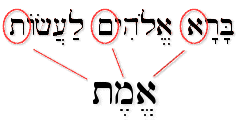 |
The idea that God created the world "to do" implies that He had finished all His work of creation (and redemption) after the sixth day (Heb. 4:3), which is another way of saying that Yeshua is the Lamb slain from the foundation of the world. "All the world was created for the Messiah." Salvation is not an afterthought or "plan B" of God's purpose for creation. "Before Abraham was, I AM." Our LORD Yeshua always is the Way, and the Truth, and the Life for us (John 14:6).
Regaining Your Focus...
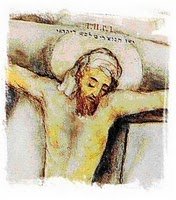
03.12.12 (Adar 18, 5772) Your faith must mean something to you if it is to mean anything before God... As Abraham Heschel once said, "God is of no importance unless He is of supreme importance." Empty prayers or rituals are useless before the LORD, since God wants your whole life, your whole heart. "Deep calleth unto deep." In order to draw close to the LORD, you must really want Him. If you are stuck there, ask Him to reveal more of His beauty and glory to you.
The worst fate is to be "forgotten" by God -- the evidence of which is being indifferent to the things of the Holy Spirit. It would be far better to be under God's correction and discipline, because the LORD is a "Consuming Fire" (אֵשׁ אכְלָה). As A.W. Tozer once said, "To most people God is an inference, not a reality. He is a deduction from evidence which they consider adequate, but He remains personally unknown to the individual." May it please the LORD to draw us close to Him, even unto the refining Fire of His Presence.
כִּי יְהוָה אֱלהֶיךָ אֵשׁ אכְלָה הוּא אֵל קַנָּא
ki · Adonai · E·lo·hey·kha · esh · o·khe·lah · hu, · El · kan·na

"For the LORD your God is a consuming fire,
a jealous God." (Deut. 4:24)
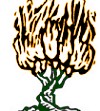
The LORD will not suffer His glory to be given to another, nor his praise given to idols of heart or mind... The idea that God is "jealous" (i.e., kanna: קַנָּא) implies that He watches over you closely, even that His heart is wounded when your affection is turned to vanity.
The solution to the dull and insensate heart is to focus on Yeshua, the Living Torah and Wisdom of God: "Whoever has my commandments (מִצְוֹתַי) and keeps them, that is the one who loves me. And the one who loves me will be loved by my Father, and I will love him and will manifest (lit., "shine within" from ἐν, "in" + φαίνω, "shine") myself to him" (John 14:21). Whoever honors the Son is honoring the Father, since God is One (John 5:23). Regarding this great promise note that Yeshua spoke of "his commandments" (τὰς ἐντολάς μου), referring to the commandments He decrees from Zion and the Torah of the New Covenant He came to deliver. But how can He "transpose the law"? Only if He Himself is the Lawgiver - the King of King of Kings who first delivered the word of the law to the people at Sinai, and only if the Sinai covenant and the Levitical priesthood was itself provisional (which it was), since there was more ancient priesthood that had more glory (i.e., the eternal mediation of Malki-Tzedek). "For when there is a change (μετατιθεμένης) in the priesthood, there is necessarily a change (μετάθεσις) in the law as well" (Heb. 7:12). The word translated "change" here comes from the verb μετατίθημι (from meta, "after" + tithemi, to "set") which might better be translated as "transposed." The idea is the priesthood reverted back to the original priesthood of Zion and therefore required a corresponding "transfer" of authority (μετάθεσις) to the original kingship as well. Yeshua has the authority to to annul some decrees, refine others, and so on.
Our focus must be on Yeshua, the very King of Glory (מֶלֶךְ הַכָּבוֹד). The author of the Book of Hebrews states that "in these last days God has spoken to us by his Son, whom He appointed the Heir of all things, through whom also He created the worlds" (Heb 1:2). Yeshua is LORD of all possible worlds... Note that the Greek construction for the phrase translated, "by his son" is ἐλάλησεν ἡμῖν ἐν υἱῷ, literally means "he spoke to us in Son" -- that is, in the language or voice of the Son of God Himself... God speaks in the language "of Son" from the midst of the fire revealed at Zion. "Therefore, since we are receiving a kingdom that cannot be shaken, let us be thankful, and so worship God acceptably with reverence and awe (μετὰ αἰδοῦς καὶ εὐλαβείας) - for our God is Esh Okhelah - a Consuming Fire" (Heb. 12:28-29).
Yeshua is YHVH and must be held in absolute awe (John 5:23). Tozer lamented the loss of such awe within the hearts of many of his day: "The conception of God current ... is so decadent as to be utterly beneath the dignity of the Most High God and actually constitutes for professed believers something amounting to a moral calamity. With our loss of the sense of majesty has come the further loss of awe and consciousness of the Divine Presence. We have lost our spirit of worship and our ability to withdraw inwardly to meet God in adoring silence" (Knowledge of the Holy).
Our basic theology states that there is one Supreme Being who is the personal Creator and Ruler of all that exists. God is both immanent (sustaining creation) and transcendent (above creation). This Source of all Life has a Name (YHVH), a mind, and a moral, purposive will that imbues all of creation. He is LORD over all time and space, the King of Glory, and Master of all possible worlds - from the highest pitch of heavenly grandeur to the lowliest depth of shame and degradation upon the criminal's execution stake. You owe your life to Him, and you will give account of every moment of your life before Him one day (Matt. 12:36-27).
כִּי שֵׁם יְהוָה אֶקְרָא הָבוּ גדֶל לֵאלהֵינוּ
ki · shem · Adonai · e·kra, · ha·vu · go·del · le·lo·hey·nu

"For I will proclaim the name of the LORD;
ascribe greatness to our God!"
(Deut. 32:3)

The Torah of Yeshua reveals something far more radical than the "theologically correct" concept that a personal and all-powerful God created the universe and demands obedience to moral law.... Various religious "monistic philosophies" proclaim just this doctrine, though they are careful to dress up the idea of "karma" (i.e., moral cause and effect) using religious code words, rituals, and specific penalties for nonconformity to their respective theological systems. The Torah of Yeshua, on the other hand, agrees that God is indeed the King and Ruler over all, but it goes beyond the "merely transcendent" to affirm that the Kingship of God extends to all possible worlds - including the realms of finitude, sickness, and even death itself. This is the Absolute Paradox, as Kierkegaard said, wherein the infinite and the finite meet in the mystery of the Incarnation.... This is where God "touches a leper," eats with sinners and prostitutes, and suffers pain and heartache like all other men... The Gloriously great God, the Creator of all the cosmos, has "emptied Himself" to come in the form of a lowly servant (δοῦλος) - disguised to the eyes of the proud and hardhearted, but revealed to those who are genuinely broken and in profound need. The LORD God is God over all possible worlds, and that includes both the celestial realms of the heavens but also the world of the fallen, the ashamed, the alienated, and the lost... God's infinite condescension reveals and augments the majesty of His infinite transcendence. There is no world - nor ever shall there be such - where the LORD God Almighty does not reign and have preeminence.
The Torah of Yeshua declares that ultimate reality is personal in a sense entirely meaningful to sinners... The message of the Cross is one of tremendous hope. Yeshua is our Bridge to the Father, the One who heals our sickness and takes away the sting of death. Sin is not rationalized away but rather is taken away by the blood of the Redeemer.... Yeshua will never be of existential interest to those who believe they can earn approval before God through their own good deeds or "good karma." The "professors" of ethics and religion have always been His most devoted enemies...
Peel away the proverbial layer of the onion, so to speak, and you will find at the center of everything the triumphant visage of One who has donned the clothing of fallen humanity in order to empathize with its suffering and raise it up (2 Cor. 4:6). The resurrection of Yeshua is the source of our abiding hope: "Because I live, you shall live also" (John 14:19). Indeed, because Yeshua tasted sin and death for every man but overcame its power, He alone holds the keys to eternal life: "He [Yeshua] is able to save completely (παντελὲς) those who come to God through Him, because he forever lives to intercede for them" (Heb. 7:25). Only Yeshua truly takes away the fear of death, just as He alone can fulfill all our dreams: "All the promises of God find their 'Yes' in him. That is why it is through him that we utter our 'Amen' to God for his glory" (2 Cor. 1:20). Best of all, He is present for you right now, if you will but open your heart and believe....
בָּרֲכִי נַפְשִׁי אֶת־יְהוָה
יְהוָה אֱלהַי גָּדַלְתָּ מְּאד
הוֹד וְהָדָר לָבָשְׁתָּ
עטֶה־אוֹר כַּשַּׂלְמָה
נוֹטֶה שָׁמַיִם כַּיְרִיעָה
ba·ra·khi · naf·shi · et · Adonai
Adonai · E·lo·hai · ga·dal·ta · me·od
hod · ve·ha·dar · la·vash·ta;
o·teh · ohr · ka·sal·mah
no·teh · sha·ma·yim · kai·ye·ri·ah

"Bless the LORD, O my soul!
O LORD my God, you are very great!
You are clothed with splendor and majesty,
covering yourself with light as with a garment,
stretching out the heavens like a curtain."
(Psalm 104:1-2)

Hebrew Study Card
When God said, "Let there be light, and there was light" (Gen. 1:3), He seemed to put on light as a robe of the Divine Majesty and Kingship: He wrapped Himself with radiance as a tallit gadol... Da lifnei mi attah omed (דַּע לִפְנֵי מִי אַתָּה עוֹמֵד) – "Know before whom you stand." The whole earth is lit up with God's glory, and every bush of the field is aflame before us -- if we have eyes to see (Isa. 6:3). May it please the LORD to open our spiritual eyes so that we can behold more of His glory and majesty in this hour... Amen.
Sabbath of the Red Cow
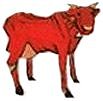
[ Passover begins in three weeks, chaverim. The Sabbath just before the start of the Biblical New Year is called Shabbat Parah, the "Sabbath of the Cow," during which the laws of the Red Heifer are reviewed in anticipation of the coming Season of Passover. ]
03.12.12 (Adar 18, 5772) Four special Sabbaths occur just before the start of spring: two before Purim and two before Passover. Collectively, these Sabbaths are called "The Four Shabbatot" and one of four additional Torah readings (called Arba Parashiyot, or the "four portions") are read on each of these Sabbaths in preparation for the spring holidays. The names of these Sabbaths are Shabbat Shekalim, Shabbat Zakhor, Shabbat Parah, and Shabbat HaChodesh, respectively.
 |
The Shabbat that immediately follows Purim is called Shabbat Parah - the "Sabbath of the [Red] Cow." In traditional synagogue services, two Torah scrolls will be removed from the ark, and from the first scroll will be read the Torah portions (Vayakhel and Pekudei), and from the second will be read parah adumah (פָרָה אֲדֻמָּה), or the chapter regarding the laws of the "Red Heifer" (Num. 19:1-22). The early sages chose this additional portion of Scripture to be reviewed at this time to help prepare for the coming New Year (i.e., Rosh Chodashim), and because the people were required to purify themselves before coming to Jerusalem for the pilgrimage festival of Passover. It is thought that since the sprinkling by the red heifer cleanses from the uncleanness of death, reading this portion will help prepare our hearts for the time of Passover when we celebrate deliverance from death.
The Red Heifer offering is considered a paradox to most Jewish thinkers, though it is clearly a picture of the Messiah Yeshua. The paradox is that the one who offers this sacrifice becomes ritually impure, while the sprinkling of the ashes is used to make people clean... The ritual is considered chok within the Jewish tradition, meaning that it makes no rational sense. In fact, the Talmud states that of all the taryag mitzvot (613 commandments), this is the only one that King Solomon could not fathom, since this sacrifice was regarded as the most paradoxical of all the sacrifices found in the Torah. The sacrifice of Yeshua the Messiah is the fulfillment of the symbolism of the parah adumah. Both were entirely rare and without defect (sin); both were sacrificed outside the camp; both made the one who offered the sacrifice unclean but made the one who was sprinkled by it clean; and finally, both sacrifices cleanse people for priestly service.
The parah adumah had to be a perfect specimen that was completely red, "without blemish, in which there is no defect (mum)." The rabbis interpreted "without blemish" as referring to the color, that is, without having so much as a single white or black hair. This is the only sacrifice in the Torah where the color of the animal is explicitly required. Moreover, the parah adumah was never to have had a yoke upon it, meaning that it must never have been used for any profane purposes.

Unlike all other sacrifices offered at the mizbeach (the altar at the Mishkan), the parah adumah was taken outside the camp and there slaughtered before the priest (in this case, Elazar, Aaron's son), who then took some of its blood and sprinkled it seven times before the Mishkan (thereby designating it as a purification offering). [During the Second Temple period, the High Priest performed this ceremony facing the Temple while atop the Mount of Olives.] Then the red heifer would be burned in its entirety: its hide, flesh, blood, and even dung were to be burned (unlike other Levitical korbanot). Unlike other offerings, all the blood of the sacrifice was to be burned in the fire.
Hyssop, scarlet yarn, and a cedar stick would then be thrown upon the burning parah adumah (these same items were used to cleanse from tzara'at, skin disease). In other words, the blood was assimilated into the ashes of the sacrifice, which were then gathered and mixed with water to create the "water of separation" (mei niddah) for the Israelite community. Note that the word "separation" (niddah) refers to menstrual impurity and harkens to Zech. 13:1: "On that day there shall be a fountain opened for the house of David and the inhabitants of Jerusalem, to cleanse them from sin and from niddah."
Anyone (or anything) that came into contact with a corpse (the embodiment of sin and death) was required to be purified using the mei niddah. The purification procedure took seven days, using stalks of hyssop dipped into the water and shaken over the ritually defiled person on the third day and then again on the seventh day. After the second sprinkling, the person undergoing the purification process would be immersed in a mikvah and then be unclean until the following evening.
The Uniqueness of the Sacrifice
The Parah Adumah sacrifice was entirely unique, for the following reasons:
- It was the only sacrifice that specifically required an animal of a particular color. This animal was extremely rare and unique of its kind (in fact, Maimonides wrote, "Nine Parot Adumot were prepared from the time the Commandment was given until the destruction of the Second Temple. Moses our Teacher prepared one, Ezra prepared one and seven more were prepared until the Destruction of the Temple. The tenth will prepared by the Mashiach." (We would say "was prepared" by the Mashiach Yeshua, blessed be He.)
- It was the only sacrifice where all the rituals were carried out outside of the camp (and later, outside the Temple precincts). That is, the "blood applications" of this sacrifice occurred in a location apart from the altar (the Talmud recounts that the High Priest performed the blood applications of the Red Heifer while gazing at the Temple and at the Holy of Holies from a mountain opposite the Temple mount).
- It was the only sacrifice that ritually contaminated the priest who offered it, but made the one who was sprinkled by it clean.
- It was the only sacrifice where the ashes were preserved and used (other sacrifices required the ashes be disposed outside of the camp).
According to Jewish tradition, this sacrifice was to atone for the sin of the Golden Calf, though the Torah itself does not make this association. The LORD Yeshua, our Mashiach, is the perfect fulfillment of the Parah Adumah, since He was completely without sin or defect (2 Cor 5:21; John 8:46); He was sacrificed outside the camp (Heb 13:13); He made Himself sin for us (2 Cor 5:21); His sprinkling makes us clean (1 Pet 1:2; Heb 12:24; Rev 1:5); and the "water of separation" that His sacrifice created is the means by which we are made clean from the impurity of sin (Eph 5:25-6; Heb 10:22).
The Haftarah for Shabbat Parah
The Haftarah read for Shabbat Parah (Ezek. 36:16-38) is ostensibly linked to the sacrifice of the Red Heifer, though on a deeper level it relates to Israel's national salvation and return to the promised land after the Great Tribulation period.... Despite the horrors of the worldwide Diaspora of the Jewish people and their faithlessness before the nations, God will be true to His promises by causing the Jews to finally accept His salvation (i.e., Yeshua) and to return to the land of Israel. At that time, "all Israel will be saved," as the Apostle Paul also foretold (Rom. 11:26). For more information about this Haftarah, see the Shabbat Parah page here.
 |
Midrash of Divine Descent

[ This week we have a "double portion" of Torah: parashat Vayakhel and Pekudei. Please read the Torah portions to "find your place" here. ]
03.12.12 (Adar 18, 5772) According to midrash, at first the Divine Presence rested on the earth, as it is written, "they heard the Voice of the LORD God walking in the mist of the garden" (Gen. 3:8). When Adam ate from the Tree of Knowledge, however, the Divine Presence withdrew to the first level of heaven. When Cain murdered Abel, the Divine Presence departed further, to the second level. During the generation of Enosh that worshiped idols, it ascended to the third heaven, and in the time of the wicked generation of the Flood, it again recoiled and went up to the fourth level. When the people built a tower to heaven the Divine Presence ascended to the fifth level; when Nimrod deified himself it went to the sixth, and in the days of Sodom it went up to the seventh.
Then a righteous man was born - Abraham - and the Divine Presence descended again to the sixth level. Abraham was followed by Isaac, and the Divine Presence came down to the fifth heaven; in Jacob's day it came down to the fourth, and in Levi's day to the third. During the days of Levi's son Kehat, the Divine Presence came to the second heaven, and finally during the time of Moses, God's Presence was manifested once again upon the earth. It was Moses whom God commanded to build the Mishkan where the Shekhinah Presence would dwell between the wings of the cherubim.
However, it was not until Yeshua emptied Himself of His Glory and came to the earth that God's Presence truly lived among us, by being clothed with human nature so that God Himself might identify with each one of us. As it is written, "In the beginning was the Word.. and the Word became flesh and dwelt among us .. full of grace and truth" (John 1:1,14). Just as the Mishkan testified of God's willingness to forgive the people - even after the sin of the Golden Calf - so the advent of Yeshua testified of God's willingness to forgive us, even though we had driven away the Divine Presence through our rebellion and sin. Indeed, because of the mediation of Yeshua as our Great High Priest, the Divine Presence is now accessible to all who come to Him by faith, since He mediates a new and better covenant that gives us direct access before the Throne of God's Grace. The Divine Presence abides within you by faith, and as "living stones" you are part of the true dwelling place of God.
 |
Vayakhel-Pekudei (ויקהל־פקודי)

[ This week we have a "double portion" of Torah: parashat Vayakhel and Pekudei. Please read the Torah portions to "find your place" here. ]
03.12.12 (Adar 18, 5772) The first of our two Torah portions this week (i.e., Vayakhel) begins the account of the building of the Mishkan (i.e., Tabernacle). This is the second time that the description of the Mishkan and its furnishings is given in the Torah (the first time occurred in the previous Torah readings of Terumah, Tetzaveh and Ki Tisa), and therefore much of this material might seem rather tedious and redundant...
Why is all this repeated? For one thing, the LORD was showing that His purposes would not be thwarted, even if Israel's sin (i.e., the Golden Calf incident) caused a delay in His will. A second reason has to do with the fundamental importance of the Mishkan and the blood atonement rituals that allowed for communion with God. The Lord was trying to emphasize that the way to come before Him was through the blood of a sacrificial victim, and this would ultimately be fulfilled in the Person of the Messiah Himself. Finally, I think that the two descriptions speak of the two advents of the Messiah Yeshua. In the first advent the Jewish people missed their opportunity for national atonement, but in the second advent they will be cleansed as a nation on the great Yom Kippur, when "all Israel shall be saved" by the One whom they initially rejected but who will be finally realized as their true Deliverer.
Before the account of the Mishkan is given, Moses assembled (וַיַּקְהֵל) the people together to repeat the commandment that the Sabbath was to be a day of "complete rest to the LORD" - shabbat shabbaton la-Adonai (שַׁבַּת שַׁבָּתוֹן לַיהוָה), and "whoever does any work (מְלָאכָה) on it shall be put to death." In particular, Moses emphasized the prohibition against kindling fire (Exod. 35:3). In Jewish tradition, this latter restriction was used to justify why the last bit of "work" performed before Shabbat begins is the kindling of the Shabbat candles: the woman of the house first lights the candles (18 minutes before sundown when Shabbat begins) and then says the blessing over the flames, officially commencing the holiness of the day of rest.
Because the Torah juxtaposes refraining from work on the Shabbat with the construction of the Mishkan, the sages regarded the two as complementary and mutually exclusive. In other words, if we could identify the types of actions required to build the Mishkan (as well as its various furnishings, sacrifices, etc.), then we would know what actions not to perform on Shabbat, especially since the construction of the Mishkan was halted for Sabbath observance. The sages who undertook this study eventually identified 39 categories of "work" (i.e., melakhah: מְלָאכָה) that were required to build the Mishkan, and called them Avot Melakhah, the "fathers" or primary categories, since they were the foundation, or the original source, for all toldot ("descendants"), or secondary types of work, that derived from them (Mishnah: Shabbat). In addition, since melakhah is primarily associated with God's work of creation as well as the activity used to create the Tabernacle, in general it may be said that it refers to "creative activity" (or to actions that promote such).
"Why does the Torah place the commandment to cease work on Shabbat next to the work of the Mishkan? To teach us that a person is guilty of violating the Shabbat only if the work he does has a counterpart in the work of making the Sanctuary: they sowed (the herbs from which to make dyes for the tapestries); you, too, shall not sow [on Shabbat]. They harvested [the herbs]; you, too, shall not harvest. They loaded the boards from the ground onto the wagons; you, too, shall not bring an object from a public domain into a private domain." (Rashi on Shabbat 49b)
In this connection it should be noted that in Jewish tradition "work" does not necessarily mean physical labor per se. For example, according to most interpretations of Jewish law, it's "kosher" to move a heavy sofa across the room on Shabbat but not to flip on a light switch or to carry a needle and thread out into the street! If you look into this, you will quickly discover that the legal discussions about what exactly is and is not "work" gets very involved and convoluted. For example, the restriction not to kindle a fire on Shabbat has led Rabbinic authorities to "build a fence" (gezerah) around the commandment by forbidding turning on electronic devices or starting automobiles on the Sabbath (since both involve the generation of a "spark"). As Yeshua warned, however, confusing the means with the end is actually a perversion of the true intent of the Torah (Matt. 12:12; Mark 2:27; John 7:24).
The second of our two Torah portions this week (i.e., Pekudei) is the final portion of the Book of Exodus. It begins with Moses' accounting of (פְּקוּדֵי) all the materials that were donated for the construction of the Mishkan (i.e., Tabernacle). Moses first recorded the inventory of the building materials and furnishings, and then he carefully checked the special priestly garments. After all the work was confirmed to be in complete accordance with the LORD's instructions, Moses blessed the people.
The LORD then commanded Moses to assemble the Mishkan on "the first month in the second year [from the date of the Exodus], on the first day of the month" (i.e., on Nisan 1, or Rosh Chodashim). Since Moses gave the commandment to begin building the Tabernacle on the day after Yom Kippur (i.e., Tishri 11), this implies that it took less than six months for Betzalel and his team to create the Tabernacle and all its furnishings. According to Pesikta Rabbati, the Mishkan was actually completed on Kislev 25, but God did not want it put up until Nisan 1 (to commemorate the birth of Isaac). The month of Kislev was thus deprived, and God said: "I must compensate it." How did God compensate the month of Kislev? With the dedication of the Temple by the Hashmoneans (on Chanukah). Note further that the Mishkan was consecrated for seven days before God manifested His Presence there. During each of the "seven days of consecration" (beginning on Adar 23) Moses set up the entire Mishkan and offered sacrifices every morning and then pulled it down. On the eighth day (i.e., Nisan 1) he put it up but did not dismantle it again.
After the Mishkan was complete and all its components were accounted for and inspected, Moses assembled it (i.e., a final time, on Nisan 1) and anointed all its components with the sacred anointing oil, called shemen ha-mishchah (note that the word "mishchah" (מִשְׁחָה) comes from the same root as "Messiah" (מָשִׁיחַ), indicating that the Mishkan would foreshadow God's plan of redemption given in Yeshua). Moses then formally initiated Aaron and his four sons into the priesthood. The Divine Presence - manifest as the Shekhinah Cloud of Glory – then filled the Holy of Holies in the Tent of Meeting.
The Book of Exodus ends: "And Moses was not able to enter the Tent of Meeting because the cloud settled on it, and the Glory of the LORD (כְּבוֹד יְהוָה) filled the Mishkan (הַמִּשְׁכָּן). Throughout all their journeys, whenever the Cloud was taken up from over the Mishkan, the people of Israel would set out. But if the Cloud was not taken up, then they did not set out till the day that it was taken up. For the Cloud of the LORD (עֲנַן יְהוָה) was on the Mishkan by day, and Fire was in it by night, in the sight of all the house of Israel throughout all their journeys" (Exod. 30:35-38).
The Presence of the Glory of God that descended from Sinai upon the newly dedicated Mishkan represented a climactic moment for the fledgling nation, since the Sin of the Golden Calf had jeopardized whether the God would indeed dwell within the midst of the camp of Israel... Recall that it was only after Moses had returned from Sinai bearing the second set of Tablets (on Yom Kippur) that the glow of the LORD's redeeming love radiated from his face, and new hope was given to Israel (prefiguring the New Covenant). The King of Glory would accompany the people from Sinai to the Promised Land! (The narrative continues in the Book of Numbers, beginning exactly one month after the Mishkan was assembled.)
Unfortunately, as we learn from later Biblical history, the Shekhinah Presence was forfeited on account of Israel's repeated failure to trust in the LORD. This was prefigured by the experiences of the Exodus generation in the desert, though it culminated in the destruction of the First Temple in 586 BC and the Second Temple in AD 70, both of which occurred on the Ninth of Av. According to some of the Jewish sages, however, when the Messiah comes to Israel, the Presence of the LORD would abide permanently with the people, since unlike beholding the veiled glory of the LORD behind the curtains of the Mishkan, the prophet Isaiah foretold: "eye to eye shall they see the return of the LORD to Zion" (Isa. 52:8):
 |
For those who are His, Yeshua the Messiah's Presence indeed abides within them forever (Matt. 28:20; John 14:16), though there is an "already-not-yet" aspect to this. In the Spirit we abide in Him and behold His glory with "unveiled face" (2 Cor. 3:18), but we also eagerly await for Him to physically return to Zion (Zech. 14:4) where "every eye will see him, even those who pierced him, and all tribes of the earth will wail on account of him." Even so. Amen" (Rev. 1:7). Yes, though we can behold Him now in the power of the Holy Spirit, Yeshua is returning (soon) to fulfill the words of the prophets regarding the establishment of the kingdom of God upon the earth. God is faithful to His covenantal promises to Israel and will fulfill them in His good time (Acts 1:7). Those who belong to Him will partake in His glory when He sits upon the throne of David as the true King of Israel. Maran ata, Yeshua!
Chazak, chazak, venitchazek: "Be strong, be strong, and let us be strengthened!"
 |
Our Purim Spiel Pictures

03.10.12 (Adar 16, 5772) Last Thursday evening we staged our annual family "Purim Spiel" (i.e., Purim play) over at my in-laws home. It was a lot of fun as we dressed in costume to reenact the story of the Book of Esther. Here are a few pictures from the event:
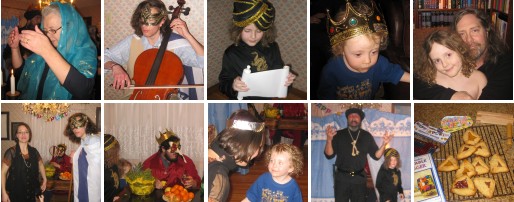
Left-to-right (top): 1. Yom Tov candles and kiddush; 2. live music for the play;
3. Josiah reads the Megillah; 4. Judah dons the crown; 5. John with Josiah after the play.
(bottom): 1. Esther and Mordechai; 2. King Ahasuerus; 3. Esther (Olga) with Judah;
4. the wicked Haman (boo!); 5. Some homemade hamentash.
After the play we ate the holiday meal and enjoyed some fellowship. We wish you could have been there! Of course, with the passing of Purim, it's now time to begin thinking about Passover which begins a month from now, on Friday, April 6th, at sundown.
Shabbat Table Talk - Ki Tisa
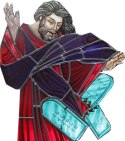
[ The following is related to this week's Torah reading (Ki Tisa). Please read the Torah portion to "find your place" here. ]
03.09.12 (Adar 15, 5772) This week's Torah portion includes the grievous account of the sin of the Golden Calf and Moses' passionate intercession for the people of Israel... After a 40 day period of heartfelt teshuvah, God accepted Moses' cries and then revealed the meaning of the divine Name YHVH (יהוה) to him.... When Moses cried out to the LORD in a state of brokenness and forgiveness, his face began to shine with glory - a glory that foretold of the New Covenant of God's grace to come in Yeshua. You can download a Shabbat Table Talk for this portion of the Torah here:
During the revelation of the Name יהוה to Moses (Exod. 34:6-7), the LORD described Himself as "merciful and gracious" (i.e., rachum ve'chanun: רַחוּם וְחַנּוּן), which has led to various discussions about how these two words are to be understood distinguished. It is well known that the word "mercy" (i.e., rachamim: רַחֲמִים) comes from the word rechem (רֶחֶם), "womb," which suggests a natural or spontaneous sense of compassion. It is natural for a mother to express innate compassion for her newborn baby, and likewise God exhibits an inherent protective love for those created in His image and likeness. The word for grace (i.e., chen: חֵן), on the other hand, goes beyond sympathetic compassion to the realm of love and kindness - especially toward those unworthy of such love. But since God's nature is love, it is the grace of God that identifies with a person in distress - an empathy wherein God sees His Presence suffering in the sinner's place. Thus, during the time of Israel's bondage the Jewish people "cried out for help... and God heard ... and God knew..." (Exod. 2:23-25). As it is also written in the Psalms: imo anokhi vetzarah (עִמּוֹ־אָנכִי בְצָרָה), "I am with him in distress" (Psalm 91:15). That the LORD is gracious means that He suffers with you; He feels your pain and knows your sorrows. God's grace represents His desire to freely identify with and to extend love and kindness to the helpless... Over and above the mercy of God which sustains us in this life, the grace of God represents the LORD's response to the inner pain of your heart. Grace represents God's broken heart for the pain He sees in you - and therefore it represents the suffering of the cross Yeshua underwent to make your heart whole.
 |
Law of the Spirit of Life

03.09.12 (Adar 15, 5772) The salvation we have in the Messiah fulfills the inner meaning of the Torah (Rom. 3:31), though the power for our obedience to the will of God now comes from a different source - that is, from the invincible and resurrected Life of Yeshua our Savior, who not only died for our guilt and sin but also lived for us as the fulfillment of Torah righteousness. We must always remember that Yeshua came not only to pay the penalty for our disobedience to the Torah (i.e., to ransom us from our captivity to the law's verdict) but to fulfill the law and the prophets on our behalf and to thereby impart to us the very righteousness of God (Matt. 5:17). Those who are "in the Messiah" are "reborn" and live an entirely different plane of existence, where sin "has no more dominion" and the inward "Torah of the Spirit of Life" (תוֹרַת רוּחַ הַחַיִּים) is in effect. The core of your being is a new heart with the Torah written upon it, and your desire is now to love and serve God (Jer. 31:31). The former covenant - and in particular, the legal aspects of the covenant ratified at Sinai - still has a "lawful" aspect (1 Tim. 1:8-11), though now we understand sin to constitute the failure to trust that God will meet our heart needs (Rom. 14:23). Therefore we must always focus on the Living Savior - the great "Sun of Righteousness" (שֶׁמֶשׁ צְדָקָה) who is the life-giving Source of existence - and not on our peripheral sinfulness, since our sin must only be understood in relationship to the Savior and His loving remedy for our lives.
Did you ever wonder why the "gospel" (τὸ εὐαγγέλιον) is called the "good news"? It is not "good news" if it simply means we are given just a "second chance" to follow Moses and to live under the constraints of the law... After all, given the chronic failure of the human condition to please God through adherence to the law, that would be just more bad news. Legalism of all kinds is a form of slavery based on conditional acceptance before God. No, Yeshua did not offer up His life so that we could follow Moses and be "renewed" in the earlier pledge to obey the laws revealed at Sinai, since the new covenant really is something new - it is a "mystery" (μυστήριον) that was previously unheard of in terms of its power and and grace. "Behold, the former things have come to pass, and new things (חֲדָשׁוֹת) I now declare; before they spring forth I tell you of them" (Isa. 42:9). This mystery centers on the righteousness of God revealed apart from the law (χωρὶς νόμου δικαιοσύνη θεοῦ) -- though the Law and the Prophets bear witness to it (Rom. 3:21).
There is law and there is grace. The law (truth) was given by Moses, but truth and grace come through Yeshua the Savior (John 1:17). The message of the new covenant is not "be like Yeshua" but rather, "you are in Yeshua," so live in the truth that you are a new creation because of what He has done - and what He is presently doing - for you. We do not grow in grace by putting ourselves under the law; no, "salvation is of the LORD," and that means salvation for this hour as well as the hour of your conversion... The LORD doesn't need your obedience to do His work, though true obedience comes through trusting in what He has done for you in the Messiah. "This is the work of God - that you believe in the One whom God has sent" (John 6:29). Following Yeshua is not a "self-improvement" project, but the power of newness of life. The miracle is "Messiah in you, the Hope of Glory" (Col. 1:27).
The essence of sanctification is the "walking out" of God's justification, or the "working out" of what God has "worked in" your heart by faith. The Cross does two things for us: It clears us of guilt and sin, and it invests us with present power and righteousness through faith... We are "justified" in Yeshua - "just-if-I'd" never sinned - and "just-if-I'd" always obeyed. This is the miracle of the "exchanged life" - the Korban Principle of the sacrifice of our Savior for our deliverance (2 Cor. 5:21). The Son sets us free to become the children of God. Because of the salvation given to us in the Messiah, we are no longer "slaves in the house" but rather are set free and made heirs of God through Yeshua of LORD.
Shabbat Shalom, chaverim. "May you grow in love and knowledge (בְּחֶסֶד וּבְדַעַת) of our LORD and Savior Yeshua the Messiah, to Whom belongs all the glory both now and to the Day of Eternity. Amen" (2 Pet. 3:18).
Healing in His Wings...

[ The following entry is related to the festival of Purim, which runs from March 7th (at sundown) through March 8th this year. For more information, see the Purim pages.]
03.08.12 (Adar 14, 5772) The Holiday of Purim celebrates our deliverance as God's people, even if we still live in an "already-not-yet" state of expectation about our final deliverance before the promised End of Days... One image that pictures this coming day of deliverance is found in the Book of Malachi, where the LORD is envisioned as "the Sun of Righteousness" who shines with healing in His wings:
וְזָרְחָה לָכֶם יִרְאֵי שְׁמִי שֶׁמֶשׁ צְדָקָה
וּמַרְפֵּא בִּכְנָפֶיהָ וִיצָאתֶם וּפִשְׁתֶּם כְּעֶגְלֵי מַרְבֵּק
וְעַסּוֹתֶם רְשָׁעִים כִּי־יִהְיוּ אֵפֶר תַּחַת כַּפּוֹת רַגְלֵיכֶם
בַּיּוֹם אֲשֶׁר אֲנִי עשֶׂה אָמַר יְהוָה צְבָאוֹת
ve·za·re·chah · la·khem · yir·ei · she·mi · she·mesh · tze·da·kah
u·mar·pei · bikh·na·fe·ha · vi·tza·tem · u·fish·tem · ke·eg·lei · mar·bek
ve·as·so·tem · re·sha·im · ki · yi·he·yu · e·fer · ta·chat · ka·pot · rag·le·khem
ba·yom · a·sher · a·ni · o·seh, · a·mar · Adonai · Tze·va·ot

"But for you who fear my Name, the Sun of Righteousness shall rise
with healing wings. You shall go out skipping like calves released from the stall.
And you shall tread down the wicked, for they will be ashes under the soles of your feet,
on the day the I am preparing, says the LORD of Hosts."
(Malachi 4:2-3)

These awesome verses from Malachi primarily apply to the Second Coming of Yeshua as Mashiach ben David and the great "Day of the LORD" (יוֹם יהוה). The "Sun of Righteousness," shemesh tzaddik (שֶׁמֶשׁ צְדָקָה), refers to the Messiah, the risen life-giving Healer of God. Of Him it is said, "The LORD God is a sun and a shield" (Psalm 84:11) and "the LORD shall be to thee an everlasting Light (אוֹר עוֹלָם), and thy God thy glory; thy sun shall no more go down, for the Lord shall be thine everlasting light" (Isa. 60:19-20). The Divine Light will shine on those who receive God's righteousness, that is, on those who put their trust in the One who said, 'I am the Light of the world' (John 8:12). The sages say, "in the world to come (עוֹלָם הַבָּא), God will bring the sun out of its sheath to burn the wicked; they will be judged by it, but the righteous will be healed by it' (Shemot Rabbah). Yeshua is compared to the "Sun" because as the Sun is the central luminous body of our world, so Yeshua is called the "Light of Life" (אוֹר הַחַיִּים). Yeshua is melech ha-kavod (מֶלֶךְ הַכָּבוֹד), "the King of Glory" -- and no one can stand before the blinding power of His countenance (Psalm 27:4; Rev. 1:8-19). His is the "Fountain of Light" for all of creation, the Source and End of all life: "For by Him all things were created, in heaven and on earth, visible and invisible, whether thrones or dominions or rulers or authorities -- all things were created through Him and for Him. And he is before all things, and in him all things hold together... that in everything He might be preeminent" (Col. 1:16-18). Yeshua will come "with healing in his wings" -- that is, in healing radiance, with rays and beams, which metaphorically describe His influence over the hearts of men... Note that the word for "wings" used in this passage (i.e., kanaf: כָּנָף) pictures the image of a heavenly tallit (טַלִּית), or the heavenly firmament (רָקִיעַ) of the LORD's sheltering Presence.
Here is a vision of the great Day of Purim to come:
Then I saw heaven opened, and behold, a white horse! The one sitting on it is called Faithful and True (נֶאֱמָן וְיָשָׁר), and in righteousness he judges and makes war. His eyes are like a flame of fire, and on his head are many diadems, and he has a Name written that no one knows but himself. He is clothed in a robe dipped in blood, and the Name by which he is called is the Word of God (דְּבַר הָאֱלהִים). And the armies of heaven, arrayed in fine linen, white and pure, were following him on white horses. From His mouth comes a sharp sword with which to strike down the nations, and He will rule them with a rod of iron. And He will tread the winepress of the fierce fury of the wrath of God, the Ruler over All (παντοκράτωρ), the LORD God Almighty (יְהוָה אֱלהֵי צְבָאוֹת). On his robe and on his thigh he has a Name written, the King of kings (מֶלֶךְ הַמְּלָכִים) and the Lord of lords (אֲדנֵי הָאֲדנִים). And with the breath of his lips He will slay the wicked. - Rev. 19:11-16
On the great Day of the LORD (יוֹם־יְהוָה הַגָּדוֹל), the wicked will become "ashes under the feet of the righteous," hearkening to the promise of in the New Testament: "The God of peace (אלהֵי הַשָּׁלוֹם) will soon crush Satan under your feet. The grace of our Lord Yeshua the Messiah be with you" (Rom. 16:20). Meanwhile, of course, we must fight the "good fight of faith" and be strong in the LORD and the power of His might. "Wondrously show Your steadfast love, O Savior of those who seek refuge from their adversaries at Your right hand" (Psalm 17:7). As King Asa once prayed, "LORD, there is no one besides Thee to help in the battle between the powerful and those who have no strength; so help us, O LORD our God, for we trust in Thee, and in Thy name have come against this multitude. O LORD, Thou art our God; let not man prevail against Thee" (2 Chron. 14:11). We offer praise in anticipation of the great deliverance to come: "Bless our God, O peoples; let the sound of his praise be heard, who has kept our soul among the living and has not let our feet slip" (Psalm 66:8-9). The LORD is surely able to keep you from stumbling and to present you blameless before the presence of his glory with great joy (Jude 1:24).
 |
HAPPY PURIM CHAVERIM!
March 7th-8th
Battle Against the Lie...

03.08.12 (Adar 14, 5772) We are living in stressful times, chaverim. The Apostle Paul wrote that the time before the prophesied "End of Days" would be "perilous" (χαλεπός) and full of human depravity (2 Tim. 3:1-5). In light of the raging spiritual war going on all around us, the following needs to be restated: "The important thing is to not lose your mind..."
The mind is the "gateway" to your heart, and it is therefore essential to guard your thinking by immersing yourself in the truth... Fear is often the result of believing the lie that God is not in control or is unable/unwilling to help you... "Not losing your mind" therefore means being grounded in what is real, and it therefore means understanding your identity and provision as a child of God. "God has not given us the spirit of fear, but of power (גְּבוּרָה / δύναμις) and of love (ἀγάπη), and of a "sound mind" (σωφρονισμός), lit. a "delivered" mind, "healed" from fragmentation (2 Tim. 1:7). The Greek word "sound mind" (σωφρονισμός) comes from the verb sodzo (σῴζω), meaning "to save," from saos (σάος) "safe," in the sense of being under restraining influence of the Spirit of God... The closest Hebrew word might be musar (מוּסָר), moral "discipline."
Part of the task of "guarding your mind" is being able to discern between good and evil. "The fear of the LORD is to hate evil (יִרְאַת יְהוָה שְׂנאת רָע); I hate arrogant pride and the evil way and perverse utterances" (Prov. 8:13). As Amos cried out, "Hate what is wrong, love what is right" (שִׂנְאוּ־רָע וְאֶהֱבוּ טוֹב). We are called to love the truth and abhor the lie. Tolerating sin in a world ripe for judgment is a tacit form of "collaboration" with the enemy... Indeed, the only thing regarded as intolerable in the devil's world is the objection that people have a supposed "liberty" to sin. But the LORD is clear on this point: "Those who call evil good and good evil are as good as dead, who turn darkness into light and light into darkness, who turn bitter into sweet and sweet into bitter. Those who think they are wise in their own sight are as good as dead, those who think they possess understanding" (Isa. 5:20-21).
The war for truth began in the Garden of Eden, when Satan lied to Eve by saying that she wouldn't die if she disobeyed God (Gen. 3:4). Satan cunningly played on Eve's fear of being deceived to persuade her to disobey. Fear, then, is the emotional center of sin and the opposite of faith. The fearful are referred to as the "unbelieving" and those who "love and make a lie" (Rev. 21:8, 22:15). The great enemy, then, is always the lie that quickens fear within the heart... Because fear destroys faith, we understand why the devil uses lies, disinformation, threats and intimidation to do his dirty work. Fearmongers, politicians, propaganda artists, alarmists, terrorists, etc., all understand that fear causes people to lose their ability to reason clearly....
Yeshua said, "For this reason I was born, and for this reason I came into the world - to bear witness to the truth. Everyone who belongs to the truth listens to my voice" (John 18:38). May God give you the grace to listen to the Spirit of truth, the wisdom to discern the presence of the lie, and the courage to rebuke those voices that try to make you afraid.
גַּם כִּי־אֵלֵךְ בְּגֵיא צַלְמָוֶת
לא־אִירָא רָע כִּי־אַתָּה עִמָּדִי
שִׁבְטְךָ וּמִשְׁעַנְתֶּךָ הֵמָּה יְנַחֲמֻנִי
gam · ki · e·lekh · be·gei · tzal·ma·vet
lo · i·ra · ra, · ki · at·tah · im·ma·di
shiv·te·kha · u·mish·an·te·kha · hem·mah · ye·na·cha·mu·ni

"Even though I walk through the valley of the shadow of death,
I will fear no evil, for You are with me;
Your rod and your staff, they comfort me"
(Psalm 23:4)
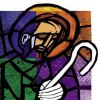
We are not left comfortless, chaverim. We must always remember that the LORD (יְהוָה) is our Good Shepherd, and His rod and staff are present, guiding and directing us, even in the deepest of darkness – even when the shadow (צֵל) of death itself (מָוֶת) seems to enshroud our way. God walks with you in the darkest valley, calling your name, saying, "do not be afraid." The LORD is always with you and you are never really alone; the LORD is your Comfortor, your Defender, and your Guide every step of the way...
Therefore you need fear no evil because God has promised to walk with you through the toughest moments of life – even in moments of personal confusion, sorrow, and inner emptiness. The LORD gives us comfort (נָחַם) in the midst of our way: "For you are my lamp, O LORD, and my God who lightens my darkness" (2 Sam. 22:29).
Purim and Yom Kippur...

[ The following entry is related to the festival of Purim, which begins Wed., March 7th (at sundown) this year. For more information, see the Purim pages.]
03.07.12 (Adar 13, 5772) Yom Kippur (the Day of Atonement) is also known as Yom Kippurim in the Torah (יוֹם כִּפֻּרִים, see Lev. 23:28), which can be read as Yom Ke-Purim, a 'day like Purim' (i.e., יוֹם, "day" + כְּ, "like" + פֻּרִים, "purim"). Both Purim and Yom Kippur celebrate our deliverance from the great enemies of sin and death, and both holidays foreshadow the great purim (deliverance) we have in Yeshua our LORD.
הִנֵּה לְשָׁלוֹם מַר־לִי מָר
וְאַתָּה חָשַׁקְתָּ נַפְשִׁי מִשַּׁחַת בְּלִי
כִּי הִשְׁלַכְתָּ אַחֲרֵי גֵוְךָ כָּל־חֲטָאָי
hin·nei · le·sha·lom · mar · li · mar
ve·at·tah · cha·shak·ta · naf·shi · mi·sha·chat · be·li
ki · hish·lakh·ta · a·cha·rei · gev·kha · kol · cha·ta·ai

"Behold, for shalom - bitterness to me; bitterness;
but You have loved my soul from the pit of nothingness,
for You have cast all my sins behind Your back."
(Isa. 38:17)

In the verse quoted above, we read that God loves the soul "from the pit of nothingness," which pictures a loving father running to rescue his child from being swallowed alive by the earth (the Hebrew verb chashak (חָשַׁק) means to embrace, picturing God's arms pulling us up from the pit). That God casts all our sins behind His back figuratively denotes oblivion – and sins of the forgiven soul can are not brought to remembrance ever again. This is similar to the image given by Micah: "He will turn again, and have mercy on us: he will put away our iniquities: and he will cast all our sins into the bottom of the sea" (Micah 7:19).
The "ultimate" meaning of Purim is to be forgiven and accepted by God on account of the winning performance, the impeccable works of righteousness, and the victory of love over judgment secured by Yeshua the Messiah at the cross... Our deliverance depends not only on the substitutionary death of Yeshua as our kapparah (atonement), but also on the substitutionary life He lived (and still lives) on our behalf. Yeshua fulfills the Torah on our behalf. The cure for our lawlessness is not more laws but a deeper sense of God's grace given to us in Yeshua, who kept the law perfectly and ransomed us from its righteous judgment.... Because of Yeshua we have grace and peace (shalom) with God.
We must be careful not to confuse cause and effect in the realm of the spiritual. After the original transgression of Adam and Eve, death became the root problem of the human condition, so to speak, with indwelling sin as its fruit (i.e., the "works of the flesh"). It is this inherited "spiritual death" that causes sin. To focus on outward behavior without first of all dealing with the underlying problem of death is therefore a spiritual misstep. It is to clean the outside of the cup or to wash the outside of a tomb in a vain attempt to disguise the truth about our unclean and dead condition. The good news is not that God wants to make bad people good, but rather wants to make dead people alive... The cure for spiritual death is to be reborn and to partake of the resurrected life of Yeshua.
Following Yeshua is not a sort of "moral reformation" or self-improvement program to make us acceptable to God. Yeshua did not die on the cross so that we could become followers of the rabbis... No! He is LORD and Master and we find salvation in His acts of deliverance done on our behalf and for our benefit. The temptation is always to go back to the law of sin and death (i.e., the principle of self-justification), but as Luther once said, "The sin underneath all our sins is the lie of the serpent that we cannot trust the love and grace of Christ and that we must take matters into our own hands."
"LORD, I need Thee every hour..." There never will be a time when we "get past" the need for God's grace given in Yeshua, since the only antidote to power of indwelling sin is the greater power of God's redeeming love within our hearts (1 John 3:8). The gospel is - not was - "the power of God for salvation (δύναμις θεοῦ ἐστιν εἰς σωτηρίαν) for everyone who believes" (Rom. 1:16); it is an ongoing source of power for our lives... Our identity is made secure in the finished work of the Messiah - we trust in His strength, not our own; it is "Messiah in you" that is the hope of glory (Col. 1:27). Just as we are given a new life entirely by means of God's grace, so we are also sanctified as we walk in that newness of life... "As you received Yeshua the Messiah the LORD, so walk in Him" (Col. 2:6). The focus is always on Yeshua and His righteousness and obedience... Every step of the way is a miracle and a wonder when we walk "in Messiah."
We walk "in Him," that is, in His strength, in His power, in His love... we don't walk "to" Him or attempt to climb the "stairway to heaven." Yeshua is the Way, the Truth, and the Life. He is the Bridge - sha'ar hashamayim (שַׁעַר הַשָּׁמָיִם) and the Divine Ladder upon whom the angels of God ascend and descend. We look to Him, not to ourselves for life. Because of the life of Yeshua within us, we are now able to bear fruit of the Holy Spirit as the Torah is written upon our hearts (Jer. 31:31). We are able to keep the Torah because the life of Yeshua empowers us to do so...
 |
The Fast of Esther...
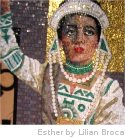
[ The Fast of Esther is observed Wed. March 7th this year. The fast begins at sunrise and ends after the Megillah (scroll) of Esther is read that evening in the synagogue. ]
03.07.12 (Adar 13, 5772) Ta'anit Esther (תַּעֲנִית אֶסְתֵּר), the Fast of Esther, recalls the three days that Queen Esther fasted before approaching King Ahasuerus on behalf of the Jewish people (Esther 4:16, 9:31). Rabbinical tradition says that Esther originally called for the three day fast from Nisan 14-16, that is, during Passover, in order to stress the severity of the need for God's intervention and deliverance.
Today Jews remember Esther's fast on the day before the festival of Purim. Unlike the original fast, the modern observance is not observed for three days, nor is it observed during the Passover season. Instead, the fast is observed on the day that Haman's evil decree called for the extermination of the Jewish people (i.e., on Adar 13). Note, however, that if Adar 13 falls on a Shabbat (as it does this year), the fast is moved to the preceding Thursday (since it is forbidden to fast on Shabbat).
Since the holiday of Purim is such a festive time, the Fast of Esther functions as a sort of "prelude" to anticipate the joy over deliverance. It is also a time to solicit the LORD for other purims needed in this dark world... For more information about this fast, click here.
 |
The Eyes of the Heart...
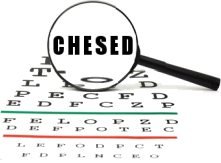
03.06.12 (Adar 12, 5772) The Danish philosopher Soren Kierkegaard (1813-1855) told the story of two young portrait artists who both sought to capture the essence of beauty in their paintings. One artist looked high and low for the "perfect face of beauty" but never found it. Tragically, he later gave up painting and lived in despair. The other artist, however, simply painted every face he saw and found beauty in each one. Now here's your question: Which of the two was the sincere artist?
The heart looks through the eye.... The good eye (i.e., ayin tovah: עַיִן טוֹבָה) - sometimes called the "beautiful eye" (עין יפה) - refuses to think evil about others (it "does not impute the bad" - οὐ λογίζεται τὸ κακόν - in 1 Cor. 13:5), but it rejoices in the truth – even if such truth is found only in the hope of a future good (1 Cor. 13:7). The good eye is the instrument of a giving heart that looks upon the needs and pains of others with genuine compassion. The "evil eye" (i.e., ayin hara: עַיִן רָעָה), on the other hand, is cynical, jaded, envious, and unsympathetic to other people and their struggles... Using a good eye takes from the treasure within the heart and gives it out freely to others: "The good person out of his good treasure brings forth good, and the evil person out of his evil treasure brings forth evil" (Matt. 12:35). There never is a risk that love may be given away without warrant from heaven. In the future judgment to come, I'd rather be found guilty of "casting pearls before swine" than to be found guilty of withholding love from others...
A person with a "good eye" looks at things from the perspective of love. Ayin hatovah looks at circumstances -- and especially at other people -- and finds something beautiful.... "Whoever sows sparingly will also reap sparingly, and whoever sows bountifully will also reap bountifully" (2 Cor. 9:6). As we give, so we are given...
טוֹב־עַיִן הוּא יְברָךְ
כִּי־נָתַן מִלַּחְמוֹ לַדָּל
tov · a·yin · hu · ye·vo·rakh
ki · na·tan · mil·lach·mo · la-dal

"Whoever has a good eye will be blessed,
for he shares his bread with the poor."
(Prov. 22:9)

This verse is fitting for the holiday of Purim, since it is a mitzvah (blessing) to perform additional acts of kindness before the holiday of Purim begins. These acts of kindness include mishloach manot (מִשְׁלוֹחַ מָנוֹת), the "sending of portions" to others (often anonymously), and mattanot la'evyonim (מַתָּנוֹת לָאֶבְיוֹנִים), the giving of gifts (tzedakah) to the poor. Like all other commandments, we see a great spiritual opportunity here: As it is written, "Tzedakah saves from death" (צְדָקָה תַּצִּיל מִמָּוֶת).
Yeshua told us, "The eye is the lamp of the body. So, if your eye is good (i.e., ἁπλοῦς, sincere, heartfelt, compassionate), then your whole body will be full of light, but if your eye is evil (i.e., πονηρὸς, wicked, malicious, ungracious), your whole body will be full of darkness. If then the light in you is darkness, how great is the darkness" (Matt. 6:22-23). May it please God to make each of us shocher tov (שׁחֵר טוֹב), "a seeker of good." May He give us new hearts to behold the good in all things...
 |
What are you Seeking?

03.06.12 (Adar 12, 5772) What are you seeking today? (John 1:38) The Spirit of the Living God calls out, "Seek Me and live" (Amos 5:4). If you are feeling empty today, ask God to feed you with His life-giving food. Ask Him for energy, power, and strength... Seek the LORD and His goodness. He is faithful and true and will surely answer the sincere cry of the heart: "You will seek me and find me, when you seek me with all your heart."
וּבִקַּשְׁתֶּם אתִי וּמְצָאתֶם
כִּי תִדְרְשֻׁנִי בְּכָל־לְבַבְכֶם
u'vik·kash·tem · o·ti · u·metz·a·tem
ki · tid·re·shu·ni · be·khol · le·vav·khem

"You will seek me and find me
if you search for me with all your heart"
(Jer. 29:13)

Note that this verse includes the implication that we will discover that the LORD is the answer to our heart's cry for love, significance, purpose, etc., when we search for Him bekhol levavkhem - with all our hearts (but not the other way around). In other words, if we do not search for God authentically - with the full passion of our hearts - then we will not find Him, since God only reveals Himself in the truth of reality. Some things in life are only known in the passion of faith... things like love, beauty, honor, and so on. As Pascal once said, "The heart has its reasons that reason knows not of..."
The problem with many of us is not that we are so hungry, but rather that we are not hungry enough... We settle for junk food when God spreads out his banqueting table before us. There is a "deeper hunger" for life, and I pray we are all touched by such hunger pangs; there is a "blessed hunger and thirst" that feeds our heart's cry for God (Matt. 5:6); there is a "divine discontent" that leads to a deeper sense of contentment for the heart...
 |
Hiddenness and Esther

[ The following entry is related to the festival of Purim, which begins Wed., March 7th (at sundown) this year. For more information, see the Purim pages.]
03.05.12 (Adar 11, 5772) Much is made over the fact that the Book of Esther is the only book of the Tanakh that does not explicitly mention the Name of God. However, the idea of God's sovereignty and hashgachah (divine providence) is clearly implied throughout the entire story, and in light of this nes nistar, or "hidden miracle" of the Jew's deliverance, the day is commemorated as a holiday of the Jewish calendar (Esther 9:22,28). Moreover, God's Name is discoverable in the book using various nonlinear modes of reading, though this can only be seen in the Hebrew language. For example, the phrase yavo ha-melech v'haman ha-yom (יָבוֹא הַמֶּלֶךְ וְהָמָן הַיּוֹם), "let the king and Haman come today" (Esther 5:4), forms an acronym of the Name of the LORD (יהוה). Furthermore, Jewish tradition maintains that whenever the book mentions the word "the king" (הַמֶּלֶךְ) without clearly specifying Ahasuerus, it indirectly refers to the LORD (e.g., Esther "stood before the king" (5:1)). Nevertheless, the sages say that because the Divine Name was deliberately omitted from the written account of the story, we should concentrate on allusions and hidden miracles of God's providential plans whenever we read the Megillah (Book of Esther) for Purim.
אָכֵן אַתָּה אֵל מִסְתַּתֵּר אֱלהֵי יִשְׂרָאֵל מוֹשִׁיעַ
a·khen · at·tah · el · mis·tat·ter · E·lo·hei · Yis·ra·el · Mo·shi·a

"Truly, you are a God who hides Himself,
O God of Israel, the Savior."
(Isa. 45:15)
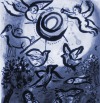
Though the Name of God is not explicitly mentioned in the Book of Esther, the story is essentially about revelation, that is, the disclosure of God's Presence despite His apparent concealment. This is suggested by the Hebrew name of the Book of Esther itself, that is, Megillat Ester (מְגִלַּת אֶסְתֵּר), since the word megillah ("scroll") is related to the word giluy (גִּלּוּי), "revelation" (from the verb galal (גָּלָה), which means to "uncover," "unroll," or to disclose) and the word Esther is related to the word hester (הֶסְתֵר), meaning "hiddenness." In other words, though the Name of the LORD is "hidden" in the Book, it is revealed by the light of revelation... Indeed, the phrase hester panim (הֶסְתֵר פָּנִים) means "hiding of face" and is often used when discussing the hidden-yet-revealed role of God in the Book of Esther. God's plan is being fulfilled, step-by-step, even if it is hidden within the "natural" world of human beings and their choices (Jer. 10:23; Prov. 21:1).
Note: Wednesday, March 7, 2012 is Ta'anit Esther - the "Fast of Esther." The fast begins at the break of dawn and ends after the Megillah (scroll) of Esther is read that evening in the synagogue... For more information about this fast, click here.
 |
Parashat Ki Tisa - כי תשא

[ The following is related to this week's Torah reading (Ki Tisa). Please read the Torah portion to "find your place" here. ]
03.04.12 (Adar 10, 5772) The Torah reading for this week is Ki Tisa, one of the Torah's longest. It includes the grievous account of the Sin of the Golden Calf (עֵגֶל מַסֵּכָה) and Moses' subsequent intercession for the Jewish people. After a 40 day period of teshuvah (repentance) for their idolatry, God finally accepted Moses' pleas for forgiveness by revealing the meaning of the divine Name YHVH (יהוה). When Moses ascended Sinai to encounter the LORD in a state of brokenness and forgiveness, his face began to shine with glory - a glory that foretold of the New Covenant of God's mercy and grace to come in Yeshua.
וְחַנּתִי אֶת־אֲשֶׁר אָחן
וְרִחַמְתִּי אֶת־אֲשֶׁר אֲרַחֵם
ve·cha·no·ti · et · a·sher · a·chon
ve·ri·cham·ti · et · a·sher · a·ra·chem

"And I will be gracious to whom I will be gracious,
and will show mercy on whom I will show mercy."
(Exod 33:19)

Download Study Card
In this week's portion, God commanded that all Israelites over the age of twenty were required to help support the Sanctuary: "each shall give (וְנָתְנוּ) a ransom for his life to the LORD" (Exod. 30:12). The sages note that the word ve'natnu can be written backward and forward, alluding to the idea that whoever gives tzedekah (i.e., "charity") never feels the loss of having given anything away (Bava Batra). Giving benevolence produces wealth; tzedakah is an investment in your spiritual future! Indeed, "charity saves from death" - tzedakah hatzil mi-mavet: / צְדָקָה תַּצִּיל מִמָּוֶת (Prov. 10:2; 11:4). The love of God is like that: when we give it away, it becomes our own possession. The converse is also true. If we withhold from others, then eventually God will make it so that we are unable to give what we would have given had we the opportunity (and consequently, we lose our blessing). In this age of economic fear, giving tzedakah is truly countercultural and faith-affirming: but the truth abides: when we give, we receive....
The midrash Yalkut Shimoni adds that God showed many great treasures to Moses. "To whom does this treasure belong?" asked Moses. "To those who give tzedakah," answered God. "And to whom does this one belong?" "To those who support orphans." And thus did God answer him regarding each treasure. Finally, Moses came upon a certain treasure and asked, "To whom does this belong?" "This belongs to one who has no merit of his own. I give him this treasure unearned," replied God. This is referred to in the words, "I will be gracious to whom I will be gracious" (Exod. 33:19). God's love is given freely, even to those who are undeserving. That's the message of the Cross of Yeshua, after all. God's love and grace is poured out to those who are without merit or hope.
Note: I hope to add some additional comments to the Torah portion a bit later, chaverim. Meanwhile, we are getting ready for the holiday of Purim, which begins this Wednesday at sundown. We hope to putting on our own little "Purim Spiel" Thursday afternoon, with the kids in costume. Some traditional Purim foods include kreplach and Hamentash (yum).
 |
A Word for the Brokenhearted

03.02.12 (Adar 8, 5772) I am often puzzled whenever a Christian advocates "Torah observance" as a way to please God, since of course the central problem of the human heart is that we cannot do this very thing, and that it is quite impossible to obey even the very first commandment, namely, to love God with all our hearts... If we are honest with ourselves, we will confess that we are inwardly broken, double-minded, even serial hypocrites -- and yet somehow we are led to believe that after we receive the good news of God's love and forgiveness found in Yeshua, we must begin anew to live under the law and to seek God's approval through obedience...
The most profound of illusions is that we "can do this" -- we can "follow Yeshua" and please God by our own efforts, by an act of will, through our own obedience... We think that we are extended grace "to enter in," but after this we are left to our own devices and must generate our own sense of commitment... No. As A.W. Pink once said, "The great mistake made by people is hoping to discover in themselves that which is found in Christ alone..." As I've said before, there is not one gospel message for the sinner and another for the saint. We will always need the life-giving gospel message, which is the word of deliverance spoken now - today - to sinners like us...
The message of the gospel is a "two-edged sword" -- it is indeed "good news" to those who are sin-sick and riddled with guilt and shame, but it is "bad news" for those who deny their inner condition before God and believe that they can justify themselves. In other words, there is no "gospel" message apart from the message of the cross of Yeshua, and the cross represents the end of the ego and its devices. We don't get saved in order to follow the path of self-righteousness; we get saved to be witnesses of God's righteousness... We love God because He first loved us (1 John 4:19). We are sanctified in precisely the same way we are justified - by God's grace alone... There never will be a time when the walk of faith involves what Yeshua has done for me plus something I can bring to the table. "He must increase, but I must decrease" (John 3:30).
Many people get the message of the cross backwards, and I am afraid this is especially true of so-called Messianic believers. "Are you so foolish? Having begun by the Spirit, are you now being perfected by the flesh?" (Gal. 3:3) The message of law is "if you behave, then you belong," which induces an alternating sense of entitlement and despair. The message of the cross is, "if you believe, then you belong." Believe what? In God's love for you - that you are made accepted and worthy because of that love... Paradoxically, by truly accepting that you are accepted -by personally receiving the love of God for your soul - you will find your heart hungering for obedience, and the true intent of the Torah will be written upon your heart.. But note carefully that the Torah will be written upon the broken heart, not the heart of stone... The gospel message is for sinners, not for the self-righteous or for those who think they can "do this thing."
אָנכִי אָנכִי הוּא מחֶה פְשָׁעֶיךָ לְמַעֲנִי
וְחַטּאתֶיךָ לא אֶזְכּר
a·no·khi · a·no·khi · hu · mo·cheh · pe·sha·ey·kha · le·ma·a·ni
ve·cha·to·tey·kha · lo · ez·kor

"I, even I, am He who blots out your transgressions for My own sake
and I will not remember your sins"
(Isa. 43:25)

Shabbat Table Talk - Tetzaveh
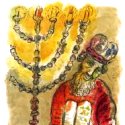
[ The following is related to this week's Torah reading (Tetzaveh). Please read the Torah portion to "find your place" here. ]
03.02.12 (Adar 8, 5772) The Mishkan (i.e., "tabernacle") constantly revealed the sacrifice of the lamb of God... The "korban tamid" (תָּמִידקָרְבַּן) was the sacrifice of a lamb every morning and afternoon upon the copper altar in the outer court. Along with it, a bread and wine offering were required, thereby revealing the true Passover Lamb of God and his sacrifice for us (Exod. 29:38-42). When the priest was consecrated for service, the blood of the "ram of ordination" was placed on his right earlobe, right thumb, and big toe of the right foot (Exod. 29:19-20). The entire sacrificial system was centered on Yeshua, the Lamb of God, whose sacrifice forever brings us near to God (for more information on the sacrificial system, click here).
Despite being sick throughout this week, by the grace of God I managed to update the "Table Talk" page for parashat Tetzaveh. Like others on this site, first I include a brief summary of the reading followed by a set of questions and answers. Hopefully this material will prompt some interesting discussion. You can download the PDF file from the linked page (above) or by directly clicking here.
Shabbat Shalom and blessings to you, in Yeshua our LORD...
 |
Heavenly Homesickness
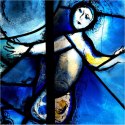
03.02.12 (Adar 8, 5772) God created human beings with an innate hunger for eternity (Eccl. 3:11), and this inner hunger for everlasting life provides a clue about the ultimate purpose or end of our lives. As C.S. Lewis noted, "If I find in myself a desire which no experience in this world can satisfy, the most probable explanation is that I was made for another world." Likewise, Augustine of Hippo put it this way, "God, you have made us for yourself, and our hearts are restless till they find their rest in you." Looking for something or someone other than Yeshua to meet our craving for life leads to idolatry and despair, but staying upon our Savior leads to fulness of life that truly satisfies the heart...
מָה רַב־טוּבְךָ אֲשֶׁר־צָפַנְתָּ לִּירֵאֶיךָ
פָּעַלְתָּ לַחסִים בָּךְ נֶגֶד בְּנֵי אָדָם
תַּסְתִּירֵם בְּסֵתֶר פָּנֶיךָ מֵרֻכְסֵי אִישׁ
תִּצְפְּנֵם בְּסֻכָּה מֵרִיב לְשׁנוֹת
mah · rav · tu·ve·kha · a·sher · tza·fan·ta · li·re·e·kha
pa·al·ta · la·cho·sim · bakh · ne·ged · be·nei · a·dam
tas·ti·rem · be·se·ter · pa·ney·kha · me·ru·khe·sei · ish
titz·pe·nem · be·suk·kah · me·riv · le·sho·not

"O how abundant is Your goodness, which You have stored up for those who revere You and worked for those who take refuge in You, in the sight of the children of mankind!
You shall hide them in the secret of Your Presence from the pride of man;
You shall keep them secretly in your tabernacle from the strife of tongues."
(Psalm 31:19-20)
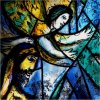
Keep pressing on, chaverim; keep your eye on the goal... As it is written, "What no eye has seen, nor ear heard, nor the heart of man imagined, what God has prepared for those who love him"(1 Cor. 2:9). Whoever thirsts for "Living Water" will find it in Yeshua our LORD.
Should Christians Celebrate Purim?

[ Note that the following entry is related to the festival of Purim, which begins at sundown Wednesday, March 7th this year. For more information, see the Purim pages.]
03.02.12 (Adar 8, 5772) Over the centuries, virtually no other book of the Tanakh ("Old Testament") has received more mixed reviews than the Book of Esther. In general it may be said that the book has been well received by the Jews, but disliked by most Christian theologians and "church" leaders. For example, the Jewish scholar Maimonides (the Rambam) praised Esther as being close in rank to that of the Torah itself: "When the Messiah comes, only Esther and the Torah will remain" (Mishneh Torah, Megillah). On the other hand, the Christian scholar Martin Luther detested the book and wished that it didn't exist at all, primarily because he thought it "Judaized" too much (Luther: Table Talk 24). Sadly, many Christian theologians have tended to agree with Luther and regard the book as unworthy of inclusion in the Bible, whereas many others do not seem to understand its message. Some Christian teachers have defamed the Book of Esther as being "a memorial to the nationalistic spirit of Judaism" (A. Weiser, Intro to OT, 1961) and even a "bloodthirsty attempt to justify ethnic pride in being a Jew" (B.W. Anderson, Esther, 1950). Others have stated that "there is not one noble character in the entire book" (L. B. Paton, The Book of Esther, 1908). Indeed, more Christian anti-Semitic statements have been made regarding the Book of Esther than any other book of the Old Testament (Moore: Esther, 1971). Do you wonder why this might be the case?
Anti-Jewish Bias in the Church
Perhaps such anti-Jewish statements have been made about the Book of Esther because many Christian theologians are essentially anti-Jewish in their thinking.... After all, the basic point of the book centers on God's providential care for ethnic Israel, and theologians such as Luther typically find this conclusion abhorrent to their theological biases. Indeed, the Book of Esther leads inescapably to the celebration of Jewish identity and survival despite the evil plans and designs of anti-Semites, and therefore Christian theologians who believe that the church replaces Israel will tend to regard the message of the book with deep suspicion (hence some teachers openly express indifference to the existence of the modern State of Israel today). For those who understand that the church partakes of the covenantal blessings given to Israel, however, the Book of Esther is a beautiful story about God's faithful love and care for His people...
Some Christian theologians attempt to "excuse" their oversight of the Book of Esther because they find in it no obvious message for the Church. Unlike the Torah-based holidays of Passover and Shavuot (which they regard as fulfilled in the New Testament), the Book of Esther seems parochial in its focus and "disconnected" from the rest of the Scriptures. In other words, since the Book of Esther (and therefore the holiday of Purim) celebrates the existence and perpetuity of the Jewish people, these theologians regard it to be of little consequence for Christians. This is actually quite an astounding conclusion, however, especially since Esther is part of the Christian canon of Scripture, and the book clearly states that "these days should be remembered and kept throughout every generation, in every clan, province, and city, and that these days of Purim should never fall into disuse among the Jews, nor should the commemoration of these days cease among their descendants" (Esther 9:28). From this text it should be clear that the only way to ignore (or suppress) the message of the book is to deny the Jewish roots of the Christian faith. How your church leaders regard the Book of Esther is a test case of whether or not they accept the heretical doctrine of Replacement Theology...
Note: To continue reading this entry, please click here...
 |
Mercy and Grace...
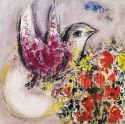
03.01.12 (Adar 7, 5772) It's been said that "mercy" is not getting what you deserve (i.e., wrath/condemnation), whereas "grace" is getting what you don't deserve (i.e., favor/eternal life). Mercy forgives sin and guilt, but grace reaches out in love to the offender -- even to the point of suffering the penalty of the offence on the offender's behalf... "God shows his love for us in that while we were still sinners, Messiah died for us" (Rom. 5:8).
הַשְׁמִיעֵנִי בַבּקֶר חַסְדֶּךָ
כִּי־בְךָ בָטָחְתִּי
הוֹדִיעֵנִי דֶּרֶךְ־זוּ אֵלֵךְ
כִּי־אֵלֶיךָ נָשָׂאתִי נַפְשִׁי
hashmieini · vaboker · chasdekha
ki · vekha · vatachti
hodieini · derekh · zu · elekh
ki · eleykha · nasati · nafshi

"Cause me to me hear your lovingkindness in the morning,
for in You do I trust.
Cause me to know the way I should go,
for I lift up my heart to you"
(Psalm 143:8)

King David wrote, "You have said, 'Seek my face,' and my heart says to you, 'Your face, LORD, do I seek'" (Psalm 27:8). This is the "antiphon" of the Shema: God calls us to hear His Voice, so we are right to earnestly ask Him to be divinely enabled to hear what the Spirit is saying... David's request is to be empowered to hear God's loving voice call at the start the day; to be assured of God's kindness and favor. Note that the Hebrew verbs used in this verse are both Hiphal imperatives, implying that God is the agent or cause of the action. We lift up our heart in expectation, understanding that the LORD alone is the One who is able to draw us near to Him: "You [God] cause me to hear... You [God] cause me to know..."
The salutation, "Grace, mercy, and peace from God" (χάρις ἔλεος εἰρήνη ἀπὸ θεου) appears in several places in the New Testament epistles, though perhaps the best example of how the two words "mercy" and "grace" are used may be found in Hebrews 4:16: "Let us then with confidence draw near to the Throne of Grace (כִּסֵּא הֶחָסֶד), that we may receive mercy (רַחֲמִים /ἔλεος) and find grace (חֶסֶד /χάρις) to help in time of need." Note that the word translated "boldly" in this verse (παρρησίας) means that we can speak freely to God from the center of our hearts -- without fear or shame.
 |
|
|












































































